
- Oct 8, 2023

Baby Milestones in the First Year: A Guide to Development and Breastfed Babies' Journey
The first year of a baby's life is a remarkable journey filled with numerous developmental milestones . These milestones encompass physical, cognitive, and emotional changes that mark the growth and progress of your little one. While every baby is unique and develops at their own pace, general patterns and behaviours are associated with each milestone. We will explore the key milestones babies typically reach during their first year and how babies may differ in their behaviours and experiences during these milestones.

Month 1-2: The Newborn Stage
The first month of a baby's life is often referred to as the "fourth trimester" because newborns are still adjusting to life outside the womb. During this time, babies primarily focus on establishing basic functions like feeding and sleeping.
Many parents wonder how often to feed their baby during this stage of incredible growth. The answer is a very straightforward one: whenever they’re hungry. Learn more about what that means here .
Feeding and Sleeping Routines : Breastfed babies typically establish their feeding routine in the first month. They should be feeding every 2-3 hours and indicating that they are getting adequate nourishment. Babies may display signs of contentment and comfort after breastfeeding, such as falling asleep and having a calm disposition. You might start to notice sleeping patterns emerge, but you can’t expect your baby to have a sleep schedule at this age.
Throughout infancy, tummy time is extremely important to a baby’s development, so be sure to put your little one on their tummy whenever you get a chance! By the time they’re two months old, they should be lifting their head and turning it to the side. On their back, they might wave their arms and legs around and start to follow an object or person with their eyes.
You might start hearing those sweet “coos” at this age. This is their first communication with you! Soak it up, and expect those adorable little smiles soon .
Month 3-4: Building Connections
As babies enter their third and fourth months, they become more alert and start to engage with their surroundings and caregivers .
Smiling and Interaction: Around the third month, many babies begin to smile responsively , especially in response to their parent's faces or voices. This is a crucial social milestone, demonstrating their growing awareness of the world around them. Breastfed babies might continue to use breastfeeding as a source of comfort and security during these interactions.
Holding a toy and adorable giggles are the hallmark milestones at this age. And while your baby won’t sleep as much as they did in the newborn stage, they’ll still be logging between 12 and 17 hours of sleep each day, and you’ll start to notice wake windows getting longer.
Month 5-6: Physical Development
Around the fifth and sixth months, babies start to gain more control over their bodies , leading to exciting changes in their behaviour.
Rolling Over : Babies typically begin to roll over and sit up with assistance during this period. You'll watch them happily pass a toy from one hand to the other, and they will LOVE to see themselves in a mirror.
Communication really starts to explode around this age, and you’ll start to hear them making intentional sounds like ‘da’ or ‘ga.’
Between 4 and 6 months is the perfect time to introduce solid foods into your baby's feeding routine. By now, breastfeeding is well established, so you might struggle with how to introduce solids into the mix. Check out our blog post to learn more about introducing solids (which is a HUGE milestone for your little one!).
Your baby might have a solid sleep schedule these days. Your baby is likely getting 2-3 naps up to two hours each. They might have stretches of up to six hours of sleep each night ! Some babies might sleep through the night, but it’s not uncommon for your baby to still wake up to breastfeed during the night.
Month 7-8: Exploring the World
At this stage, babies become more mobile and curious, which significantly influences their interactions with the environment.
Sitting Up : Many babies start to sit up with support or on their own during these months . This newfound mobility can lead to a sense of independence, but babies may still use breastfeeding or their bottle as a source of comfort and reassurance.
Your baby might be trying to chew, which means they’re ready for larger pieces of table foods! They’re probably also mastering their pincer grasp, which is picking up a piece of food using their index finger and thumb.
You’ll notice your little one loves to explore books (especially trying to chew at the corners or rip the pages). They will look for people when prompted. For example, if you say, "Where's Mum?" They might look around to find her.
These milestones set the stage for some major physical and cognitive milestones you can expect in the next several months.
Month 9-10: Cognitive Development
As babies approach their first birthday, their cognitive abilities become more apparent, impacting how they perceive and interact with the world .
Crawling : Around the nine to ten-month mark, babies often begin to crawl. This newfound mobility allows them to explore their surroundings more actively. For breastfed babies, crawling might temporarily take a back seat during breastfeeding sessions, but they may become more independent in managing these transitions.
About 75% of babies sleep through the night, starting around nine months of age . Don’t be alarmed if your little one is still waking during the night. Some babies wake up during the night for comfort or milk until well after their first birthday. Your baby will likely have transitioned from three to two naps daily, making your schedule much more predictable.
Month 11-12: Preparing for Toddlerhood
As your baby approaches their first birthday, they are on the brink of toddlerhood. Their milestones during this period reflect their readiness to take on new challenges .
First Steps : Some babies may take their first steps around their first birthday. This is a significant physical milestone, so you can expect your baby to be extra fussy or have trouble sleeping during this big one!
If your baby isn’t walking yet, they probably pull themselves up, stand unassisted for a few seconds, or even cruise along furniture. All of these are great steps towards their first steps!
Your baby will start to make more meaningful and intentional sounds at this age, saying "mama," "dada," and others! They will point to objects and respond to their name as they reach one year old.
Babies this age need six small meals a day: breakfast, lunch, and dinner, plus a snack in the morning, afternoon, and before bedtime. One-year-olds are becoming independent and want to feed themselves. Even though it makes a mess, it is important to give babies the opportunity to develop the skill of feeding themselves.
On their first birthday, your (almost) toddler will probably still be taking two naps during the day. But they'll be ready to transition to one nap in the next few months. Look for signs that your toddler is ready to make this change.
Breastfed Babies and Milestones
Breastfeeding plays a crucial role in a baby's life, not only for nutrition but also for emotional comfort and bonding. Breastfed babies may exhibit unique behaviours during milestones due to the comfort and security they associate with breastfeeding:
Consistent Feeding Patterns : Breastfed babies may maintain a relatively consistent feeding pattern during milestones, seeking nourishment and comfort from breastfeeding. This can be particularly noticeable when they are tired or stressed.
Breastfeeding as a Source of Comfort: Breastfeeding often provides comfort and security for babies during moments of uncertainty or discomfort , even as they reach milestones. This can be seen in their preference for breastfeeding when they are tired or overwhelmed.
Independence and Breastfeeding: As babies gain more independence during milestones like crawling or walking, they may temporarily reduce their breastfeeding frequency. However, they often return to breastfeeding for comfort and reassurance.
Sleep and Milestones : Breastfed babies may experience changes in their sleep patterns during milestones. They might wake more frequently or have difficulty falling asleep due to the excitement and cognitive development associated with reaching new milestones.
Supporting Babies During Milestones
Supporting babies during their developmental milestones is crucial for their well-being and emotional security. Here are some tips for parents:
Be Patient : Understand that feeding might become more frequent during milestones, and your baby may seek extra comfort. Be patient and responsive to their needs.
Provide a Safe Environment: As your baby becomes more mobile, create a safe space for exploration.
Maintain a Routine : Consistency can be comforting for babies. Stick to a regular feeding and sleeping routine to help your baby feel secure during milestones.
Seek Support: Don't hesitate to reach out to a lactation consultant or healthcare provider if you have concerns about milestones. They can offer guidance and reassurance.
Celebrate Achievements : Celebrate your baby's milestones with enthusiasm and encouragement. Your positive reinforcement can boost their confidence as they explore the world around them.
The first year of a baby's life is a remarkable journey filled with incredible growth and development. While babies may display unique behaviours during milestones, it's essential to remember that every baby is different. Providing love, support, and a nurturing environment is crucial to helping your baby thrive during this exciting period. As you witness your little one's milestones, cherish the moments of breastfeeding as they continue to be a source of comfort and bonding throughout the first year and beyond.
Please note that the information provided in this article is for educational purposes and should not replace professional medical advice. Always consult with a healthcare provider for specific concerns about your baby's development and breastfeeding journey.

Recent Posts
Is your baby constantly spitting up after feeding? What’s normal, and when should you be concerned
Weaning your little one from breastfeeding
Nursing All Day and All Night: Is It Comfort Nursing or Hunger?
- Search Please fill out this field.
- Newsletters
- Sweepstakes
- Raising Kids
- Behavior & Development
A Week-by-Week Guide to Your Baby's First Year Milestones
It can be fun to look at what your baby might learn and do during their remarkable first year of life. But don't worry too much if they aren't meeting every milestone in the precise week this guide suggests. Every child is unique—some babies will reach certain milestones sooner and hit others later.
Keep a pediatrician or health care provider in the loop about your observations, questions, and concerns as they can help determine if anything warrants investigation. Intervention can make a significant difference when developmental red flags are caught early.
Read on to learn more about baby milestones by week during your little one's first 12 months.
Parents/Getty Images
Newborn Baby Milestones
Newborns are still adjusting to life outside of the womb. That said, they're already hitting milestones in their first month, like focusing their eyes and making new sounds.
It's only been a week, but your newborn already knows they can rely on you. By now, they can recognize your voice, and the familiarity helps them adjust to the strange new world outside the womb. Of course, they can't understand your words, but talking to them is an expression of love and will eventually lay the foundations for language development in their brain.
In their second week of life, your baby can focus on objects 8 to 14 inches away—about the distance between their eyes and yours during a feeding. So as you feed your little one , move your head slowly from side to side and see if their eyes follow you. This exercise helps build their eye muscles and tracking skills.
Though their movements are still random and jerky, your baby can start snuggling by week three. As you hold them, watch how they adjust their posture towards you. They find your arms and even your scent calming and comforting.
Have you noticed your baby using their vocal cords in ways other than crying? For example, they may coo and make "ahh" sounds around week four, especially when they see a parent. Babies learn by mimicking, so replay their sounds back to them to promote progression through key newborn developmental milestones.
1-Month Baby Milestones
At 1 month , you can expect your baby to hit some exciting milestones, like smoother movements, smiles, and lifting their head. Here's a breakdown.
This week, your baby's movements will likely become smoother and more purposeful while those random jerky motions begin to disappear. Set aside time each day to help them move their body.
For example, you can give them a gentle mini-workout by slowly pulling them to a sitting position. Or let them "fly" by resting them tummy-down on your forearm. Their neck muscles are still pretty weak, though, so always support their head during movement.
Around this age, your baby will start to flash an adorable gummy grin— their first genuine smile that's not just an involuntary reflex from gas or urination. How can you tell? Their eyes will brighten and widen as they move the corners of their mouth upward.
As another infant milestone, your baby will start understanding senses; they will be able to look at a rattle and connect it to the sound it makes. They're also becoming partial to color, preferring bright hues and three-dimensional objects over flat black and white ones.
While your little one's head is still wobbly, those neck muscles are getting stronger by the day. In fact, your baby can probably lift their head about 45 degrees. Put them on their stomach for brief, supervised periods every day so they can practice.
It's important to remember that all milestones are estimated. Every baby is different, and yours might hit their developmental milestones a little earlier or later than what's average—and that's totally fine. As always, if you have concerns about your baby's development, please speak with a pediatrician or health care provider.
2-Month Baby Milestones
Your baby's 2-month milestones include cooing, more extended periods of wakefulness, and experimenting with their hands. Here's what to watch for.
Sounds fascinate your baby, especially high tones and pitches. They're also interested in hearing you talk and will stare intently at your mouth as you speak to them. They may even reply with cooing or goo-ing .
Around week 10, your baby can pick out their parent's face in a group. When someone familiar comes near, they might respond with wide eyes and gleeful wiggling—a sign they're honing their social skills. This is a perfect time to include them in family activities. For example, bring them to the table during dinner, or put them in a carrier or sling while you work.
Your baby stays awake for longer periods now. They're anxious to learn about the world but may not always be interested in your game choice. So, if they turn their head and look away, they may be overstimulated or ready to move on to something else.
At this fun baby stage, your little one likely has discovered an endless source of enchantment: their hands . They've probably realized that those fingers and thumbs are separate objects. They may also bring their hands together, look at them, then put them in their mouth to taste. Let them experiment with these wonderful tools by offering different textures for them to feel, such as a crinkle book or a rubbery toy.
SolStock/Getty Images
3-Month Baby Milestones
Baby milestones at 3 months get even more exciting. You can expect babbling , laughing, and better-developed hand-eye coordination. In addition, your baby may start becoming mobile by attempting to roll over. Get ready for this active stage!
Besides bestowing sweet smiles and coos on you, your baby may laugh , chuckle, and babble in long chains. These development milestones are some of the most cherished for parents and caregivers.
Rattles and dangling toys do more than amuse your baby at 14 weeks; they also develop their hand and eye skills. Your infant is also likely to be intrigued by multi-textured toys, bright primary colors, and things that make sounds. They'll bat or grasp them (and, of course, they'll also try to put them in their mouth).
Say goodbye to a relatively stationary baby. Around week 15, your little one may start rolling over —either from back to front or front to back. In the coming weeks, they'll likely master rolls in one direction. As a safety precaution, make sure they're never left alone on a bed or high surface and discontinue swaddling at this stage.
Your little one is getting stronger by the day. They may protest when placed on their stomach, but they still need supervised tummy time daily to exercise their neck, chest, rib cage, and arm muscles. These muscle groups are necessary for rolling over, sitting up, and crawling.
Join them on the floor and talk outside their vision range. They'll be distracted and may stop fussing for a few minutes while they're busy looking for you!
4-Month Baby Milestones
By 4 months, your baby is developing a more playful personality. Milestones at 4 months include blowing raspberries, pointing, and expressing emotions. Keep an eye out for these specifics.
Your baby probably entertains everyone (including themselves) by making razzing noises or blowing raspberries. They'll laugh when you tickle their belly and mimic your words by making similar sounds. Boost both their ego and speech skills by chatting and making eye contact with them whenever possible.
Around this point in your baby's developmental timeline, you may be pleasantly surprised to find them peacefully playing alone . Their eyesight is sharp now, and their depth perception is also improving. In addition, they're very busy using their eyes and hands in play to learn about themselves.
You may think you hear some words like "dada" at this age, but at 19 weeks, your baby doesn't mean anything by those sounds; they're simply putting consonants together with vowels. Still, you can help them connect sounds with meanings by labeling things: Point to pictures in their books and touch their eyes, nose, and mouth while naming them. Before long, they'll be calling you by name!
By now, your baby knows who you are, and they're even starting to understand themselves. They smile when seeing their reflection in a mirror and begin displaying some distinct personality traits. By watching their face, you'll probably be able to detect how they express different emotions, too.
5-Month Baby Milestones
A 5-month-old wants to move! At this age, prepare for creeping (an early form of crawling) and trying to use their muscles in new ways. Here's the lowdown on the baby milestones by week.
Your baby is on the go as they reach five months. They may creep around the floor and turn direction to get a new view. Put them on the floor or in a playpen and let them entertain themselves (while keeping a close eye, of course).
This week, your baby's favorite experiment might be putting everything into their mouth . They may also be conducting some new tests, like dropping toys to the ground and comparing the different sounds they make.
Infants develop muscle coordination from the head down. At this point in their development, they've likely acquired strength in their upper body, but their legs and torso are ready for a new challenge. So, try some ways to help them progress, such as gently pulling them to a standing position on your lap or pulling them to a sitting position on the floor.
Your baby is already storing memories this week. They recognize names, basic words like "no" and "bye-bye," as well as familiar sounds. Your baby probably looks when you point out objects, and they may also point at things when you name them. Called receptive language, this skill precedes a baby's ability to speak. Since your baby remembers daily rituals, try greeting them each morning with the same phrase. They'll begin to look forward to it just as you do!
6-Month Baby Milestones
Midway through your baby's first year , their milestone achievements may vary more wildly. For example, while your friend's baby might start crawling at 6 months, yours may wait until closer to 10 months. According to the American Academy of Pediatrics (AAP), both are perfectly normal. Here's what else you can expect.
Some of the most significant physical milestones—such as gross motor skills like sitting, crawling, and walking—will occur at vastly different rates from baby to baby over the next several months. By week 25, your baby may be more steady when trying to sit, but they probably still need help. Prop them up with a few pillows to cushion any falls.
Your baby's still a charmer, but they may be more selective about giving out smiles to strangers. They might also be afraid to be away from you due to newfound separation anxiety . Try leaving shortly after a feeding to help soothe their anxieties and make your partings less sorrowful. Sticking to your schedule and establishing a "goodbye" routine can help give them a sense of security.
You may have noticed your baby dropping things on the floor. This action teaches them about cause and effect. When they get the response they expect, it reinforces their understanding of how the world works.
By week 28, your baby is using their hands in more sophisticated ways. For example, they may clap or imitate wiping off their food tray. They may be ready to start eating solids , so watch for readiness signs.
According to the AAP, babies who are ready for solids will meet the following criteria:
- They can hold up their head
- They open their mouth when food comes toward them
- They swallow food (rather than thrust it back out)
- They've doubled their birth weight
Most babies are ready around 6 months of age , and you should never start solids before 4 months.
7-Month Baby Milestones
Your baby is maturing emotionally at 7 months . They love playing with you, are working on their mobility, and are becoming more dexterous. Here's what else you can expect.
While they're not ready to host dinner parties, your baby is probably eager for some more sophisticated ways of socializing. For example, they may be fond of peek-a-boo and other group games.
If they haven't already started to crawl , your baby is busy mastering the muscular coordination and strength necessary for this feat. Their first attempts may be "creeping" (propelling themselves on their belly). Next, they may push up on their hands and knees and rock. Give them lots of time on the floor to practice and encouragement. Placing a toy just out of reach can help encourage new crawlers.
Your baby's hands have likely evolved from little paws to little tools. Instead of clumsily grabbing things, they're learning to manipulate their thumb and forefinger to pick up and hold objects. This "pincer grasp" will develop more in the next several weeks. As their fine motor skills develop , you'll want to be extra vigilant about keeping choking hazards off the floor and away from their curious fingers.
Though they're still too young to pull themselves up, your child may be able to stand and lean against furniture. You can soften their falls and encourage this type of exploring by placing rugs or blankets underneath them.
8-Month Baby Milestones
Your 8-month-old is becoming coordinated and strong! In addition, they're learning to comprehend common words and recall skills, like how to make a toy emit noise. And get ready—they may start pulling themselves up on furniture! Here's what else to expect at 8 months .
Your little person has their own opinions, and they'll be sure to let you know what they do and don't like. Though it might be unnerving, bear in mind that they're experimenting with emotions and learning how to control their environment.
You've probably noticed your baby has gained more coordination and strength in their legs and feet. They may have finally figured out how to pull themselves up to a standing position. Encourage them to stand by placing a favorite toy on the seat of a sturdy chair. Point to the chair, tell them the toy is there, and cheer for them to get up and grab it. Just be sure you're nearby in case of a tumble!
Your baby may be stringing syllables together and placing different consonants with vowels. They may comprehend common words like "ball" and "bottle." Satisfy their thirst for knowledge by reading lots of baby books and labeling things. They're taking in every word.
At around 8 or 9 months, a baby can create memories from their experiences. For example, they might look at a ball, remember how it moves, then push it. They can even set goals for themselves, like making noise from a pan by crawling to it and banging it with a spoon.
Prostock-Studio/getty images
9-Month Baby Milestones
At 9 months, your baby is more mobile and can get into many things. So batten down the hatches, and keep an eye out for these 9-month milestones .
If you haven't already, now is an excellent time to start babyproofing : Look around the house and put dangerous objects safely out of your baby's reach. Their curiosity is boundless, and their mobility gets them around further and faster.
Around 38 weeks, your baby will likely leave a trail wherever they go. As they scoot around the house, they may pull books off shelves and clear cabinets of their contents. They may even happily tip over wastebaskets. Though it's tiring for you to clean up after them constantly, this inquisitiveness is a natural part of their development.
If it seems that your baby is always sticking something into their mouth, you're probably right. Babies between the ages of 8 to 12 months spend a lot of their waking hours either gumming, turning over, or banging small objects.
As you go about your day doing seemingly mundane tasks, your baby is intently watching you. They're also starting to imitate you. For example, if given a chance, they might take a toothbrush and run it across their gums or teeth or try combing their hair. Mimicking is an essential way for your baby to learn .
10-Month Baby Milestones
Babies at 10 months old love repetition and exploration. They're also starting to understand object permanence—the idea that you still exist even if you leave the room. Look out for these milestones at 10 months .
You may have spent the past three nights rereading Goodnight Moon at your baby's insistence. They may focus on each page and feel comforted by seeing the same images and hearing the same words over and over. Don't fight their requests for repetition as this exchange builds their self-esteem.
Your baby is probably giving you plenty of exercise. By week 42, your little one is constantly on the go and discovering new and faster ways to move. They're likely cruising while holding furniture and may even be making a few wobbly unassisted steps. The more time they get to practice using their legs, the stronger and more coordinated they'll be.
Out of sight but not out of mind: Your baby now knows that objects exist even when they can't see them. They'll look under blankets for a misplaced book or play games by dropping a toy in a container and then turning it upside down to find it again. You can reinforce this concept of object permanence by playing a rudimentary game of hide-and-seek. For example, hide a toy under a cup and let them find it.
Your baby has discovered that there's more to the world than what meets the eye on ground level. The allure of stairs and furniture is irresistible, so be sure you've installed safety gates for this baby stage. And if you haven't already, make sure your entire house is child-proofed.
11-Month Baby Milestones
Your 11-month-old is becoming more and more independent. They pride themselves on doing things themselves. They may begin walking—or at least trying! Be alert and ready to leap to the rescue for these 11-month milestones .
By now, your baby likely prefers feeding themselves and might even grab the spoon from you during mealtimes. This practice helps them master fine motor skills.
Your baby's personality is really blossoming now. They're developing their own opinions and aren't shy about expressing their preferences for people and activities. If diaper changes are becoming wrestling matches, keep in mind that they're flexing their newfound independence—a positive step in development.
To limit accidents for your increasingly mobile baby, lay down the laws of the land. Though it's crucial for them to learn by exploration, they also need some limits and boundaries. Provide this guidance by giving simple directions and demonstrations: We walk to the sidewalk, then stop. With some consistency, you'll notice improvements week by week.
Your baby may not be walking yet, but they're trying to get around. They may cruise on furniture or hold your hands while taking steps. Attempting to walk is a significant milestone, though babies may take that first unassisted step anywhere from 8 to 15 months. You can help their walking skills by giving them a sturdy push-pull toy and placing furniture in strategic areas to encourage their cruising.
12-Month Baby Milestones
It's toddler time! At 12 months , your little one looks and acts less like a baby and more like a child. Even so, as they flex their independence, they also need your reassurance. Here's what to watch for at 12 months.
There's a flip side to your baby's newfound independence: insecurity. They realize that they're a separate entity from you by doing things on their own. Their anxiety around strangers may return, too. Reassure them by staying close when they need you and giving them attention when they turn to you.
You may be ready to collapse at the end of the day, but your baby may be too excited by their new accomplishments to sleep. Sticking to a consistent bedtime routine is helpful to signal it's time for sleep. For instance, hold them in your arms during their last feeding in a darkened room and gently rock them while singing. By establishing a relaxing bedtime ritual , they'll soon be able to expect and appreciate the break from their busy day.
Your baby is learning just how much they can handle. For example, they've likely discovered they can hang onto an item in each hand and tuck one under their arm to pick up a third.
Happy birthday to your baby! While you're reveling in all the changes since your baby entered your life last year, they may give you a present of their own: Calling you by your chosen name, whether it's mama, dada, nana, papa, or something else. They're on the brink of using more words, too, so encourage their interest in language by speaking slowly and clearly. You're preparing your baby for a lifetime of learning.
Keep in mind that every baby develops at their own pace, and there's a wide range of normal when it comes to weekly milestones. If you're concerned about your baby's growth and development, talk to their pediatrician or a health care provider.
Baby Milestones . American Academy of Pediatrics.
Developmental Milestones: 1 Month . American Academy of Pediatrics.
Tummy Time for a Healthy Baby . U.S. Department of Health and Human Services.
Early Relational Health Developmental Milestone Timeline . American Academy of Pediatrics.
Movement: Babies 8 to 12 Months . American Academy of Pediatrics.
Starting Solid Foods . American Academy of Pediatrics.
Cognitive Development in Infants: 4 to 7 Months . American Academy of Pediatrics.
Related Articles
Official websites use .gov
A .gov website belongs to an official government organization in the United States.
Secure .gov websites use HTTPS
A lock ( ) or https:// means you've safely connected to the .gov website. Share sensitive information only on official, secure websites.
Important Milestones: Your Child By One Year
CDC’s milestones and parent tips have been updated and new checklist ages have been added (15 and 30 months). For more information about the updates to CDC’s developmental milestones, please review the Pediatrics journal article and these important key points .
How your child plays, learns, speaks, acts, and moves offers important clues about your child’s development. Developmental milestones are things most children (75% or more) can do by a certain age.
Check the milestones your child has reached by 1 year by completing a checklist with CDC’s free Milestone Tracker mobile app, for iOS and Android devices, using the Digital Online Checklist , or by printing the checklist [755 KB, 2 Pages, Print Only] below.
“Learn the Signs. Act Early.” materials are not a substitute for standardized, validated developmental screening tools .
What most children do by this age:
Social/emotional milestones.
Close this video
Language/Communication Milestones
Close video
Cognitive Milestones (learning, thinking, problem-solving)
Movement/physical development milestones.

Pulls up to stand
1 of 2 images
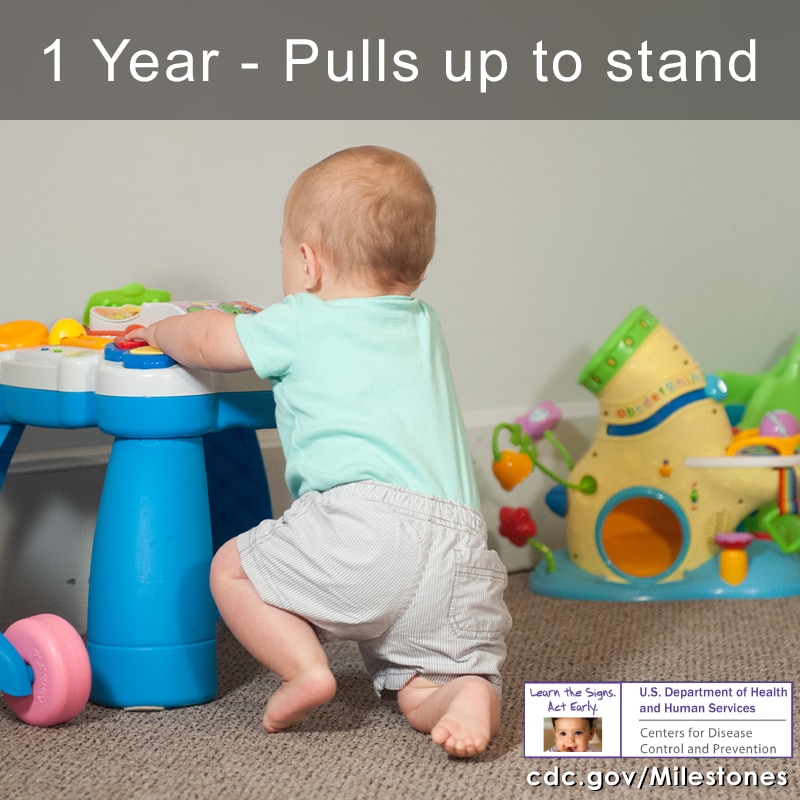
2 of 2 images
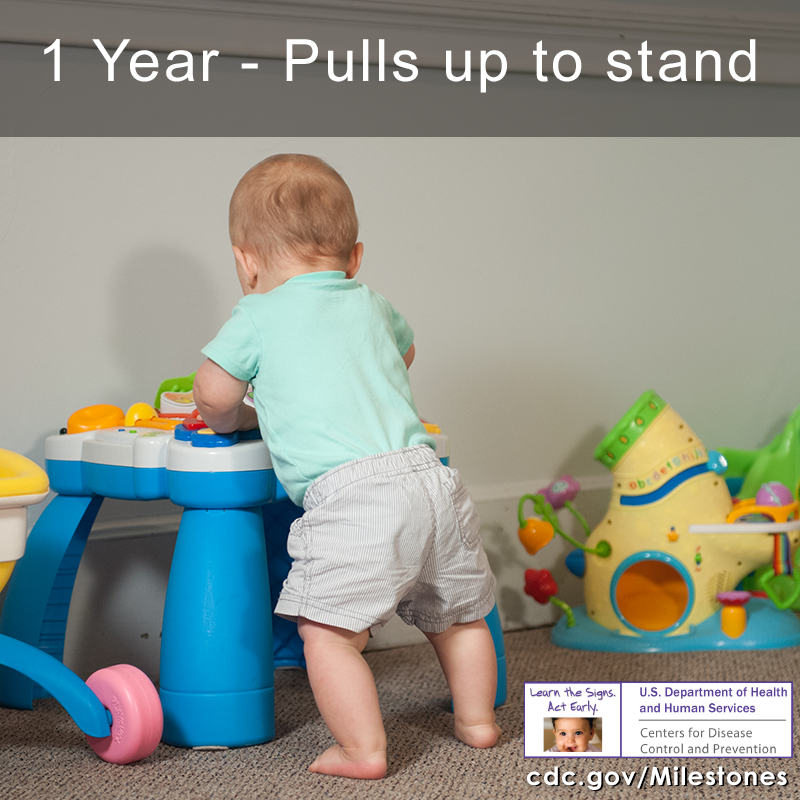
Other important things to share with the doctor…
- What are some things you and your baby do together?
- What are some things your baby likes to do?
- Is there anything your baby does or does not do that concerns you?
- Has your baby lost any skills he/she once had?
- Does your baby have any special healthcare needs or was he/she born prematurely?
Concerned About Your Child’s Development? Act Early.
You know your child best. Don’t wait. If your child is not meeting one or more milestones, has lost skills he or she once had, or you have other concerns, act early. Talk with your child’s doctor, share your concerns, and ask about developmental screening.
If you or the doctor are still concerned:
- Ask for a referral to a specialist who can evaluate your child more; and
- Call your state or territory’s early intervention program to find out if your child can get services to help. Learn more and find the number at cdc.gov/FindEI .
For more on how to help your child, visit cdc.gov/Concerned .
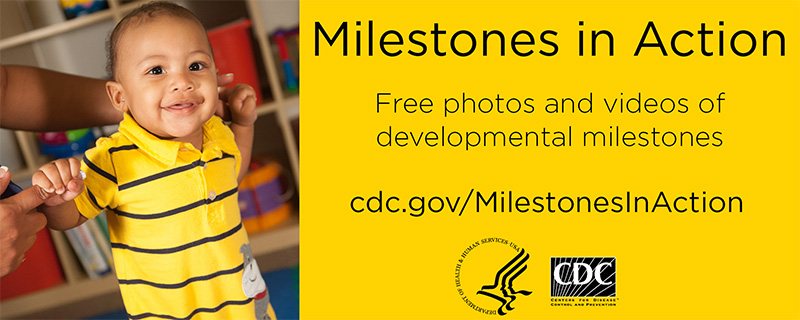
As your baby’s first teacher, you can help his or her learning and brain development. Try these simple tips and activities in a safe way. Talk with your baby’s doctor and teachers if you have questions or for more ideas on how to help your baby’s development.
- Teach your baby “wanted behaviors.” Show her what to do and use positive words or give her hugs and kisses when she does it. For example, if she pulls your pet’s tail, teach her how to pet gently and give her a hug when she does it.
- Talk or sing to your baby about what you’re doing. For example, “Mommy is washing your hands” or sing, “This is the way we wash our hands.”
- Build on what your baby tries to say. If he says “ta,” say “Yes, a truck,” or if he says “truck,” say “Yes, that’s a big, blue truck.”
- Redirect your baby quickly and consistently by giving her a toy or moving her if she is getting into things you don’t want her to get into. Save “no” for behaviors that are dangerous. When you say “no,” say it firmly. Do not spank, yell, or give her long explanations.
- Give your baby safe places to explore. Baby-proof your home. For example, move sharp or breakable things out of reach. Lock away medicines, chemicals, and cleaning products. Save the Poison Help Line number, 800-222-1222, in all phones.
- Respond with words when your baby points. Babies point to ask for things. For example, say “You want the cup? Here is the cup. It’s your cup.” If he tries to say “cup,” celebrate his attempt.
- Point to interesting things you see, such as a truck, bus, or animals. This will help your baby pay attention to what others are “showing” him through pointing.
- Limit screen time (TV, tablets, phones, etc.) to video calling with loved ones. Screen time is not recommended for children younger than 2 years of age. Babies learn by talking, playing, and interacting with others.
- Give your baby water, breast milk, or plain milk. You don’t need to give your baby juice, but if you do, give 4 ounces or less a day of 100% fruit juice. Do not give your baby other sugary beverages, such as fruit drinks, soda, sports drinks, or flavored milks.
- Help your baby get used to foods with different tastes and textures. Foods can be smooth, mashed, or finely chopped. Your baby might not like every food on the first try. Give your baby a chance to try foods again and again.
- Give your baby time to get to know a new caregiver. Bring a favorite toy, stuffed animal, or blanket to help comfort your baby.
- Give your baby pots and pans or a small musical instrument like a drum or cymbals. Encourage your baby to make noise.
- Find out about foods that are choking risks. Let your baby practice feeding himself safe foods with his fingers and using a cup with a small amount of water. Sit next to your baby and enjoy mealtime together. Expect spills. Learning is messy and fun!
- Make sure your baby gets enough sleep: 4- to 12-month-olds need 12 to 16 hours of sleep a day (including naps). Consistent sleep times make it easier!
- “Read” books with your baby. Reading can be talking about pictures. Babies this age like books with things they can feel or flaps they can lift.
- Play together with blocks and other toys that encourage your baby to use her hands.
- Babies learn to calm themselves from caregivers who are calm and make them feel safe. Help your baby learn she can calm down by talking softly, holding, rocking, or singing to her. Let her suck on her fingers or a pacifier.
- Let your baby push things around, such as empty boxes, a “kiddie chair,” or “push toys,” so he can practice walking.
- Encourage your baby to practice walking on her own. Baby walkers are not recommended. Let her hold your hands or hold onto furniture that is safe.
Special acknowledgments to the subject matter experts and others who contributed to the review of data and selection of developmental milestones, especially Paul H. Lipkin, MD, Michelle M. Macias, MD, Julie F. Pajek, PhD, Judith S. Shaw, EdD, MPH, RN, Karnesha Slaughter, MPH, Jane K. Squires, PhD, Toni M. Whitaker, MD, Lisa D. Wiggins, PhD, and Jennifer M. Zubler, MD.
Sincere gratitude to Natalia Benza, MD and José O. Rodríguez, MD, MBA for their thoughtful review of the Spanish-language translation of these milestones.
- Developmental Disabilities
- Child Development
- Positive Parenting Tips
- National Center on Birth Defects and Developmental Disabilities
- Foods and Drinks for 6 to 24 Month Olds
Print Milestone Checklist
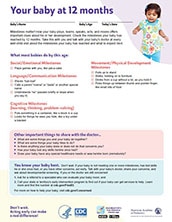
English [1 MB, 2 Pages, Print Only] Spanish [1 MB, 2 Pages, Print Only]
Order free materials

Related articles

Tools you might be interested in

Baby Growth Chart

What are Your Diaper Bag Essentials?

My Perfect Fit

Product Comparator
12 moments you’ll want to write down during baby’s first year.
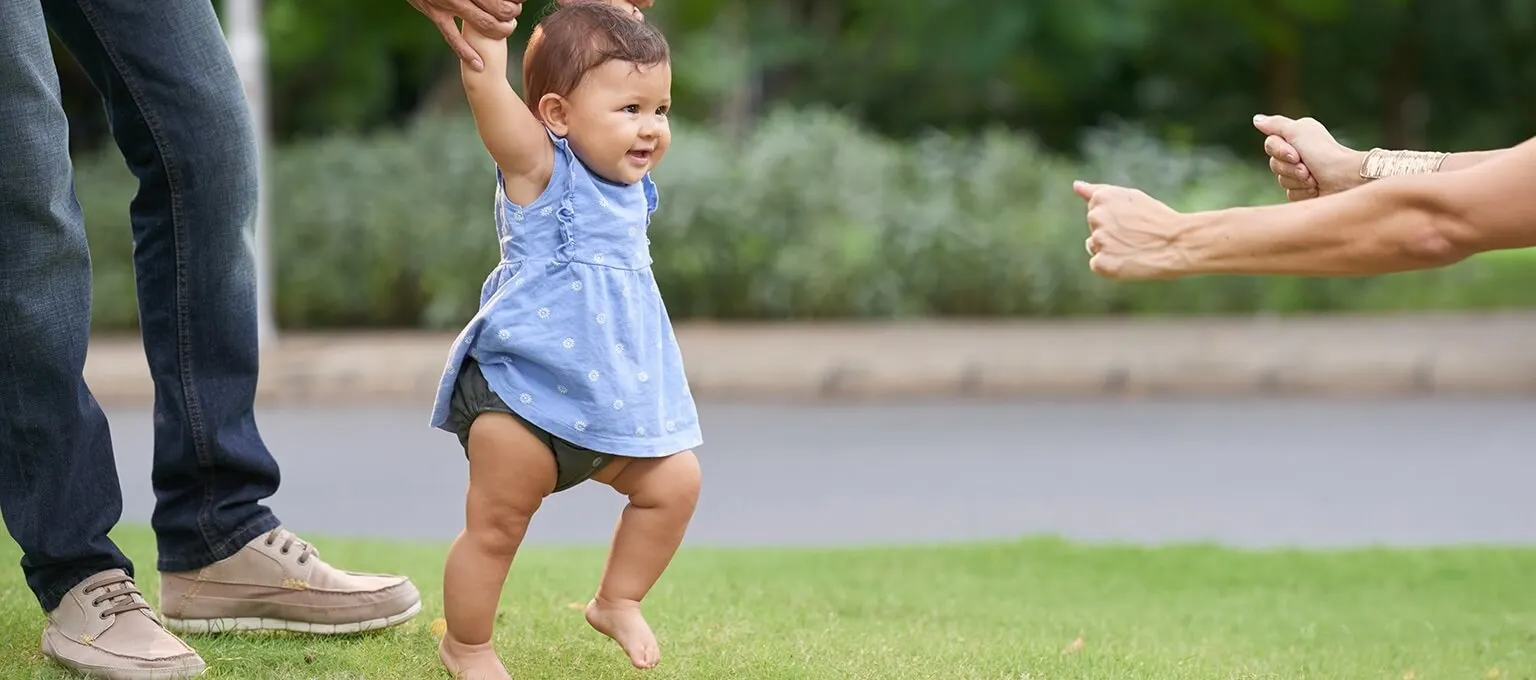
As a new mom, everyday is a learning experience and I’m taking all of these moments in. Each day that I spend with my little girl, I’m learning new things about her and watching her grow and learn right before my very eyes. It seems like everyone (and I mean everyone) who sees me with my newborn baby says, “Time goes by so fast, enjoy every minute of it.”
Baby's First Moments
The first year of one’s life is marked with many milestone firsts that if you don’t make note of, you’re likely to forget. With smartphones, it seems like the number of photos our children will have of their lives is significantly higher than the amount other generations had. With the ability to document these moments at our fingertips, why not take it a step further and make note of those special firsts throughout your baby’s life. It doesn’t have to be as elaborate as pulling out the craft supplies and making a baby book, just jotting down the date, time, location, and maybe your feelings when these milestones occurred in a note on your phone will suffice.
Most Memorable Moments
As I take this journey on this first year of parenthood with my precious baby, here are some things I know I’ll want to document so I can remember forever.
1. Smile - In those first few weeks your newborn can smile, but it’s not on purpose or usually means they are passing gas. Do you remember that first smile they gave you? There’s nothing better than making someone smile.
2. Laugh - Laughter is the best medicine and remembering that first giggle is something you will always cherish.
3. Sat up, rolled over, crawled - These are all milestones giving momentum towards taking those first steps. All are exciting developmental milestones and something to be noted.
4. Ate solid foods - What did your little one eat? Maybe they will look back and it’ll still be one of their favorite foods.
5. Stayed with a babysitter - Who was the sitter? Grandma and Grandpa? What did mom and dad do? What were the emotions leaving the baby for the first time? A fun memory for all!
6. Slept through the night - This is a true victory for all! What did you do to celebrate?
7. First family outing - With a new baby it can feel daunting to get out of the house. Where did you go? How long did you make it out? The more details, the better when you look back on this one.
8. Said mama and dada - This is probably more exciting for the parent than the baby, but nonetheless a special memory.
9. First steps - Yay! Where were they? Who was all there? How many steps did they take before falling?
10. Tooth - Ouch teething can be a real pain, but a first tooth appearance is exciting!
11. Half birthday - The trend of capturing every month is a great way to see your baby’s progress. It’s crazy how much they grow and develop in a year! Create a special photo opportunity for their half birthday. Why stop there, you can have a mini celebration!
12. Everything in-between big & small - There is no memory too big or small you can’t decide is worthy of capturing.
Before you know it you’ll have a year full of firsts to reflect on and it’ll be something your child will cherish as they get older and start asking about their first year of life.
Related Articles:
15 reasons I’m thankful to my kids for making me a Mom
These Words Have Taken on an Entire New Meaning Now That I’m a Parent
How I Finally Learned to Love the Newborn Stage
Serena Norr is a writer/editor and mama of three girls. She charts their adventures on her blog, The Weekend Jaunts. You can also find her on Instagram @WeekendJaunts.
Review this article:
Read more about baby.
- Explore Baby Sleep
- Parenting Life
- Development
Join a World of Support
through Pregnancy and Parenthood.

TRACK WITH TOOLS

LEARN WITH EXPERTS

GET REWARDED

Where You Already Belong
- Cooking + Eating
- Nursing + Feeding
- Play + Discovery
- Health + Safety
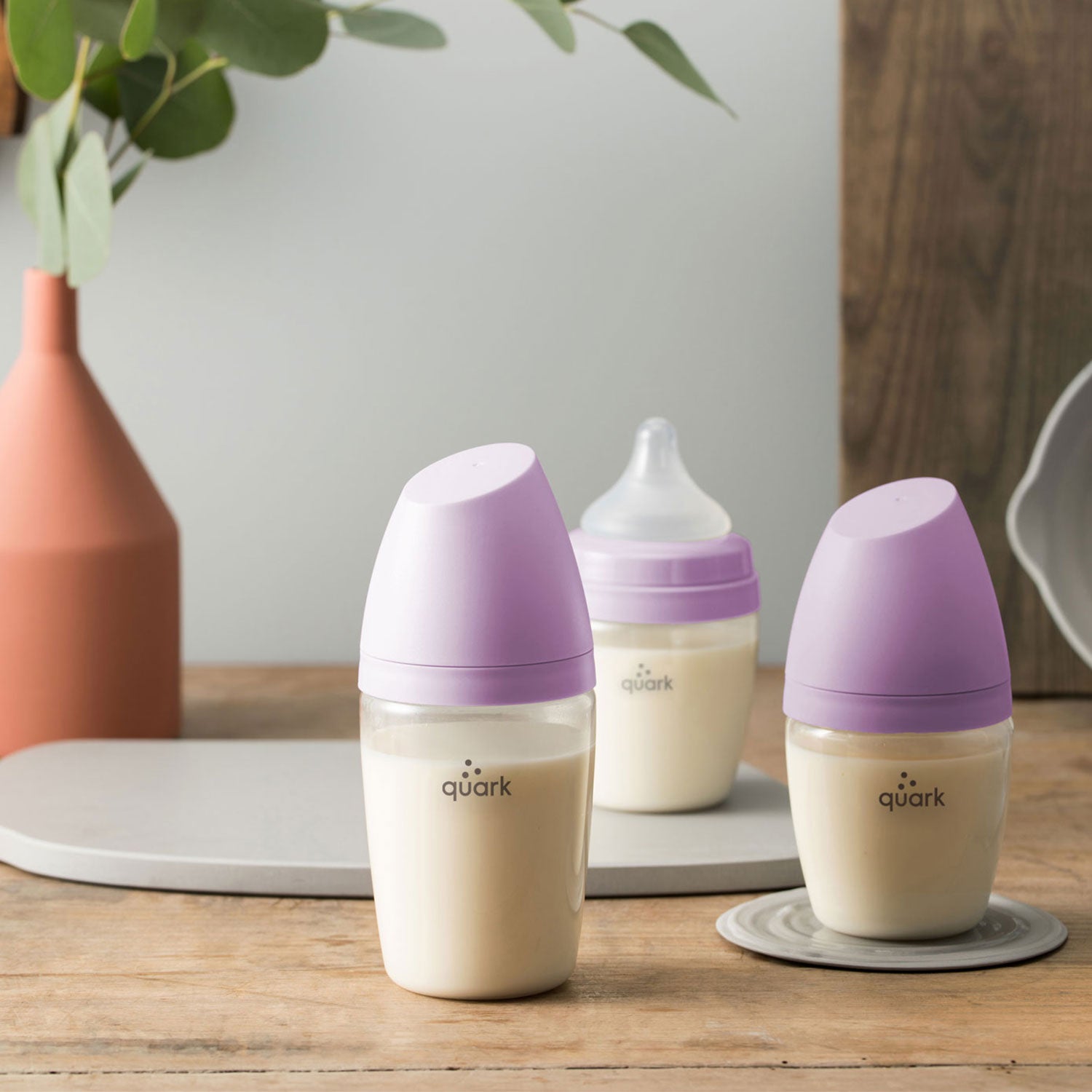
Upgrade your diaper bag
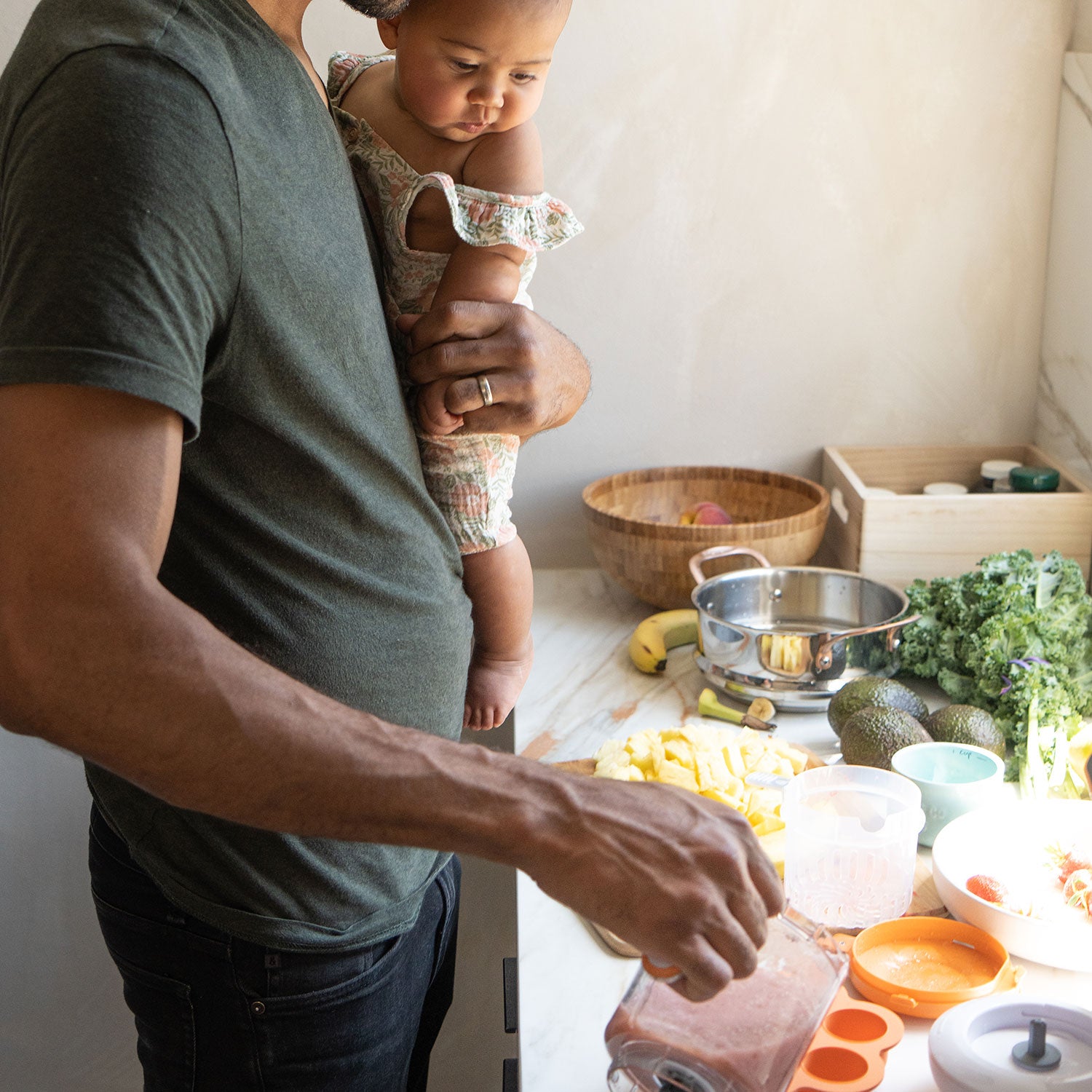
Up your baby food game
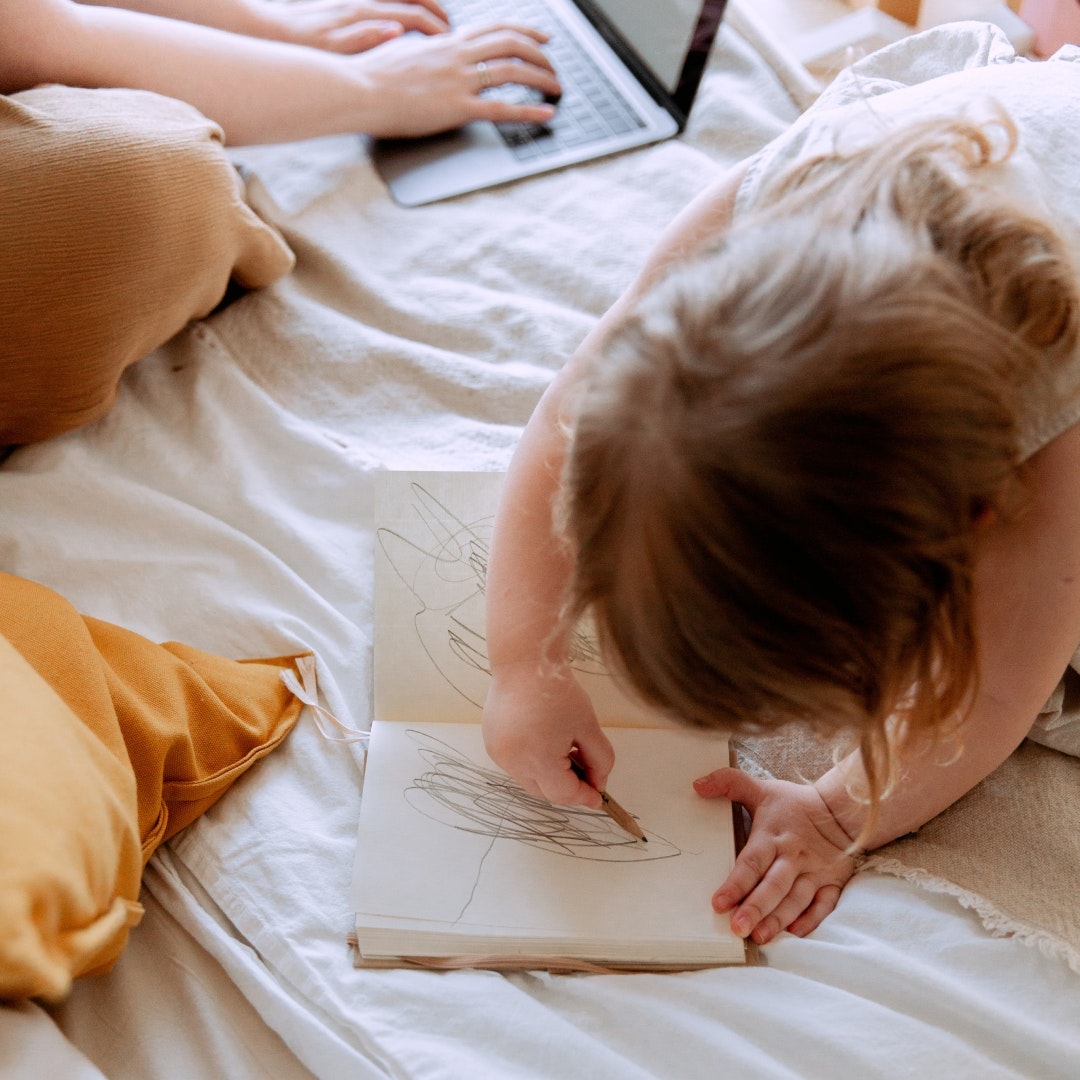
- Support Center
- Activate Warranty
- Track an Order
- Get in Touch
- 1-855-HI-QUARK
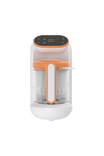
Cookie policy
We use cookies and similar technologies to provide the best experience on our website. Refer to our Privacy Policy for more information.
Your cart is empty
Understanding Baby Development: A Week-by-Week Guide for the First Year
Apr 28, 2024
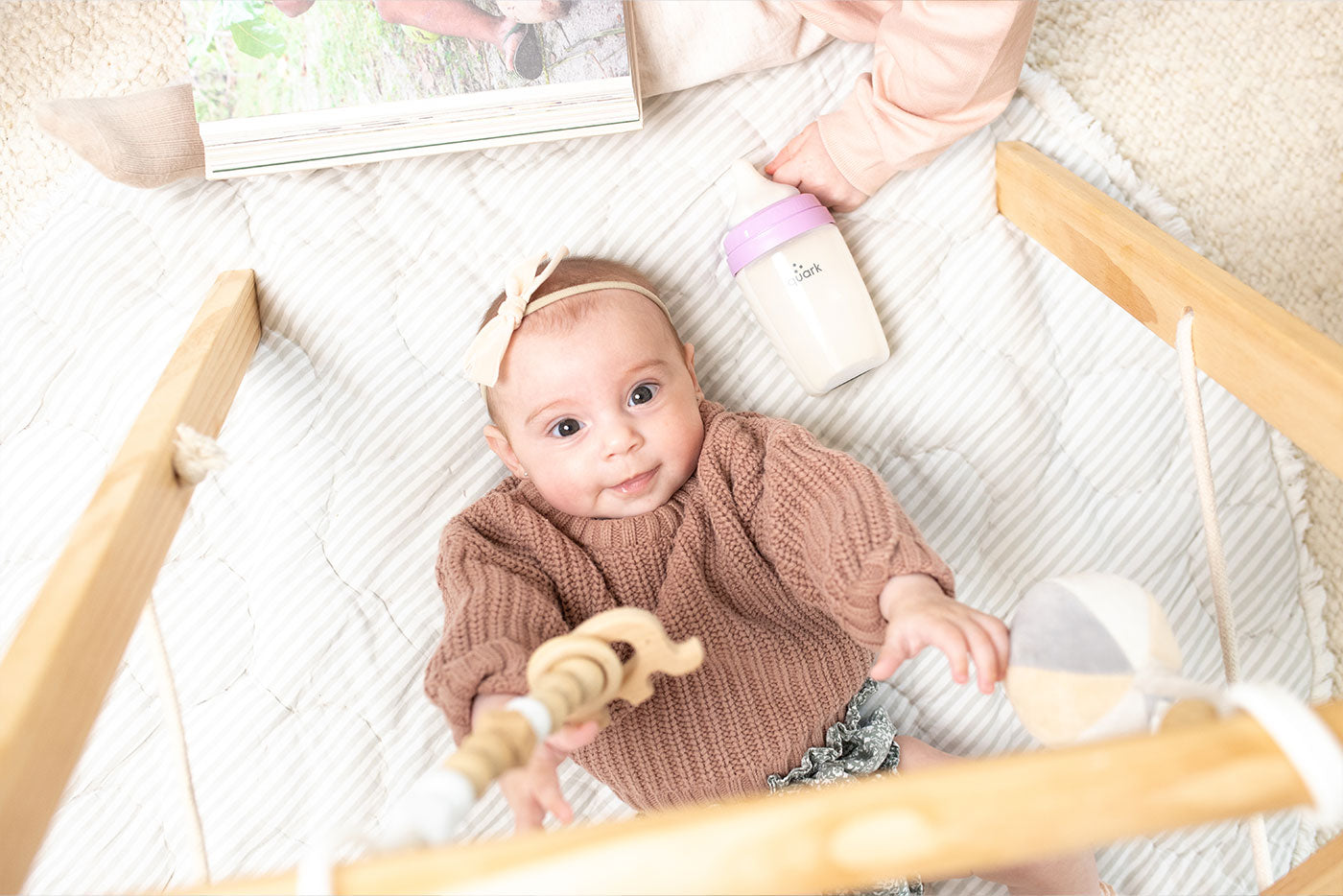
Introduction to Baby Milestones
In the journey of early childhood development, each week brings new progress and exciting changes. Understanding these milestones not only prepares you for what to expect but also ensures that your baby's growth is on a healthy trajectory. Here’s a comprehensive, week-by-week guide that covers the significant milestones in your baby’s first year, offering insight into their physical, emotional, and cognitive development.
Newborn Baby Milestones: Weeks 1-4
Week 1: sensory adjustment.
During the first week, your baby begins adjusting to the world outside the womb. Key developments include recognizing your voice and finding comfort in its familiarity. This early recognition lays the groundwork for emotional security and future language skills.
Week 2: Visual Development
By week two, your newborn can focus on objects 8 to 14 inches away—the perfect distance for gazing at your face during feeding times. This period is crucial for strengthening eye muscles and enhancing visual tracking.
Week 3: Early Social Cues
The third week might see your baby starting to snuggle more actively. Their movements, though still uncoordinated, show an early preference for human contact, which is calming and reassuring for them.
Week 4: Vocal Exploration
Around the fourth week, expect to hear more than just cries. Your baby might start to coo and make "ahh" sounds, signaling the beginning stages of verbal communication.
1-Month Baby Milestones: Weeks 5-8
Week 5: smoother movements.
Noticeable changes in movement coordination occur around the fifth week. Your baby’s motions become smoother as their muscle control develops, allowing for more purposeful interaction with their surroundings.
Week 6: The First Real Smile
Week six often brings a milestone that every parent anticipates—the first genuine smile, accompanied by bright eyes and an expressive face.
Week 7: Sensory Connections
By the seventh week, your baby begins to associate sounds with objects, like a rattle, and shows a preference for bright, colorful items over monochromatic visuals.
Week 8: Physical Strength
As the neck muscles strengthen, your baby will start lifting their head about 45 degrees when on their stomach. This exercise is essential for muscle development and coordination.
2-Month Baby Milestones: Weeks 9-12
Week 9: fascination with sounds.
At nine weeks, your baby shows increased interest in sounds, particularly high tones. Their reaction to voices, including cooing back, highlights developing auditory and speech faculties.
Week 10: Social Recognition
By week ten, babies can start recognizing familiar faces and may respond with excitement, indicating early social engagement.
Week 11: Increasing Wakefulness
This week, your baby may stay awake for longer stretches, showing curiosity about the world, albeit they might get overstimulated quickly.
Week 12: Discovery of Hands
Discovering their hands as objects they can control marks a significant developmental step, often happening around the twelfth week. This discovery is crucial for cognitive and motor skills development.
3-Month Baby Milestones: Weeks 13-16
Week 13: emotional expression.
The thirteenth week can bring laughter and babbling as your baby becomes more expressive and begins to experiment with forming sounds.
Week 14: Enhancing Motor Skills
Toys that dangle and rattle not only entertain but also improve hand-eye coordination as your baby reaches out and grasps them.
Week 15: Mobility Onset
Around the fifteenth week, your baby may start to roll over, marking an important milestone in physical development and mobility.
Week 16: Strength and Stamina
Continued strength in muscles supporting the neck, chest, and arms helps your baby in activities like sitting up and crawling, which may start to emerge around this time.
Beyond Milestones: Ensuring Healthy Development
Every child develops at their own pace, and while milestones provide a general guideline, they are not strict benchmarks. Regular consultations with healthcare providers ensure that your baby’s growth and development are on track. Here’s what to look out for in the subsequent months of development.
4-Month Baby Milestones: Weeks 17-20
Week 17: playful interaction.
By week 17, your baby might start to blow raspberries and react with giggles when tickled. Engaging in back-and-forth vocalizations at this stage boosts their speech development and social skills.
Week 18: Independent Play
Around week 18, your baby's vision and depth perception improve significantly, allowing them to play more independently. They begin to explore their surroundings with greater interest and ability.
Week 19: Early Language Skills
At 19 weeks, babies start experimenting with combining vowels and consonants, such as "ba" and "da." Encouraging them by naming and pointing to objects helps connect sounds with meanings, fostering early language skills.
Week 20: Self-Awareness
By now, your baby recognizes familiar faces, including their own reflection in a mirror. This recognition is a sign of developing self-awareness and emotional intelligence.
5-Month Baby Milestones: Weeks 21-24
Week 21: increased mobility.
As they reach five months, babies become more curious and mobile. They may start to creep, changing their perspective and exploring the environment more actively.
Week 22: Explorative Play
During week 22, everything becomes interesting to your baby, especially toys that make sounds. They might also begin testing gravity by dropping objects to see what happens, enhancing their understanding of cause and effect.
Week 23: Developing Fine Motor Skills
The development of fine motor skills accelerates around week 23. Watch as your baby starts using the pincer grasp to pick up objects, a crucial skill for self-feeding and further tactile exploration.
Week 24: Cognitive Recognition
By week 24, your baby starts to recognize names and basic commands like "no" and "bye-bye." This period marks significant advancement in memory and comprehension, essential for language development.
6-Month Baby Milestones: Weeks 25-28
Week 25: sitting and crawling.
Some babies begin to sit without support at 25 weeks and may show signs of crawling. These activities are significant indicators of physical strength and coordination development.
Week 26: Social Selectivity
Your baby might start showing a preference for familiar people, displaying more selective social behaviors. Establishing routines can help them feel more secure during this stage.
Week 27: Understanding Cause and Effect
The action of dropping toys to see what happens teaches babies about cause and effect, a fundamental concept in cognitive development.
Week 28: Eating Solids
As your baby approaches the end of their sixth month, they may show readiness for solid foods. Signs include good head control, opening the mouth for incoming food, and showing interest in what you are eating.
7-Month Baby Milestones: Weeks 29-32
Week 29: social games.
Peek-a-boo and similar games become very enjoyable for your baby at this stage, reflecting their growing social and cognitive skills.
Week 30: Mastery of Crawling
If they haven't started already, by week 30, most babies master crawling, significantly enhancing their ability to explore their environment.
Week 31: Improved Dexterity
The refinement of the pincer grasp around week 31 allows your baby to handle objects more skillfully, which is important for self-feeding and further sensory exploration.
Week 32: Early Standing
Though not ready to walk, your baby may start pulling themselves up to stand with support. This development is crucial for the next stages of mobility.
8-Month Baby Milestones: Weeks 33-36
Week 33: asserting preferences.
By the eighth month, your baby starts expressing likes and dislikes more clearly, which can be challenging but is a normal part of emotional development.
Week 34: Pulling Up to Stand
Gaining the strength to pull themselves up to a standing position is a significant milestone typically achieved around week 34.
Week 35: Early Language Comprehension
Your baby may start to understand common words and phrases, demonstrating an increasing capacity for language acquisition.
Week 36: Goal-Oriented Behavior
As they near the end of the eighth month, babies engage in more complex behaviors, such as setting goals and achieving them, like crawling to a toy to make noise.
Looking Back: Embracing Each Milestone
As you witness these milestones, remember that each baby's journey is unique. Celebrate their achievements, provide stimulating environments, and always consult with healthcare professionals to ensure they are developing at a healthy pace. Understanding and supporting your baby’s development can make this first year a wonderful journey of growth and discovery.
9-Month Baby Milestones: Weeks 37-40
Week 37: enhanced object manipulation.
At this stage, babies become adept at manipulating objects with their hands, moving them from one hand to the other and exploring their properties.
Week 38: Initial Steps of Communication
Your baby might start using gestures, such as waving "bye-bye" or shaking their head for "no," indicating a growing understanding of basic communication.
Week 39: Problem Solving Skills
Babies begin solving simple problems, like figuring out how to reach a toy that's out of immediate reach, demonstrating early cognitive skills.
Week 40: Depth Perception
Improved depth perception allows your baby to judge distances more accurately, essential for the next stages of physical movement like walking.
10-Month Baby Milestones: Weeks 41-44
Week 41: standing without support.
Many babies begin to stand unaided at around 41 weeks. This milestone is a significant precursor to walking.
Week 42: First Words
Some babies might say their first intentional words, often "mama" or "dada," at this age, marking a significant leap in language development.
Week 43: Fine Motor Skills Refinement
The refinement of fine motor skills continues, with your baby being able to place smaller objects into containers and start to show hand preference.
Week 44: Cognitive Skills Development
Your baby’s ability to understand simple instructions and recognize familiar routines shows an advancement in cognitive skills.
11-Month Baby Milestones: Weeks 45-48
Week 45: exploring boundaries.
Babies often become more adventurous, testing boundaries and showing more defiance as they become more independent.
Week 46: Enhanced Imitation
Your baby might start imitating actions and sounds more accurately, which is vital for learning and social interaction.
Week 47: Early Problem-Solving
Babies enhance their problem-solving skills by experimenting with different ways to achieve their goals, like finding hidden objects.

Week 48: Anticipating Routines
Your baby will likely start to anticipate and react to daily routines, showing that they remember and expect what comes next.
12-Month Baby Milestones: Weeks 49-52
Week 49: walking.
Many babies take their first steps around this week, an exciting milestone that ushers in a new phase of mobility and exploration.
Week 50: More Complex Gestures
At 50 weeks, expect to see more complex gestures and combinations of sounds as your baby communicates more effectively.
Week 51: Problem Solving and Play
Your baby might engage in more sophisticated problem-solving during play, like stacking blocks or matching shapes.
Week 52: First Birthday Reflection
By their first birthday, most babies have tripled their birth weight, can stand alone, and may walk. They understand simple commands and can say a few words, marking profound growth and development.
Conclusion: Celebrating a Year of Milestones
The first year of a baby's life is filled with rapid and exciting development. From the first smile to the first steps, each milestone is a testament to their growth and the care they receive. Continue to nurture your baby’s development with love, play, and interaction, and always keep in touch with your pediatrician to ensure that your baby is progressing well. This first year forms the foundation of their future, filled with endless possibilities and discoveries.
Reading next
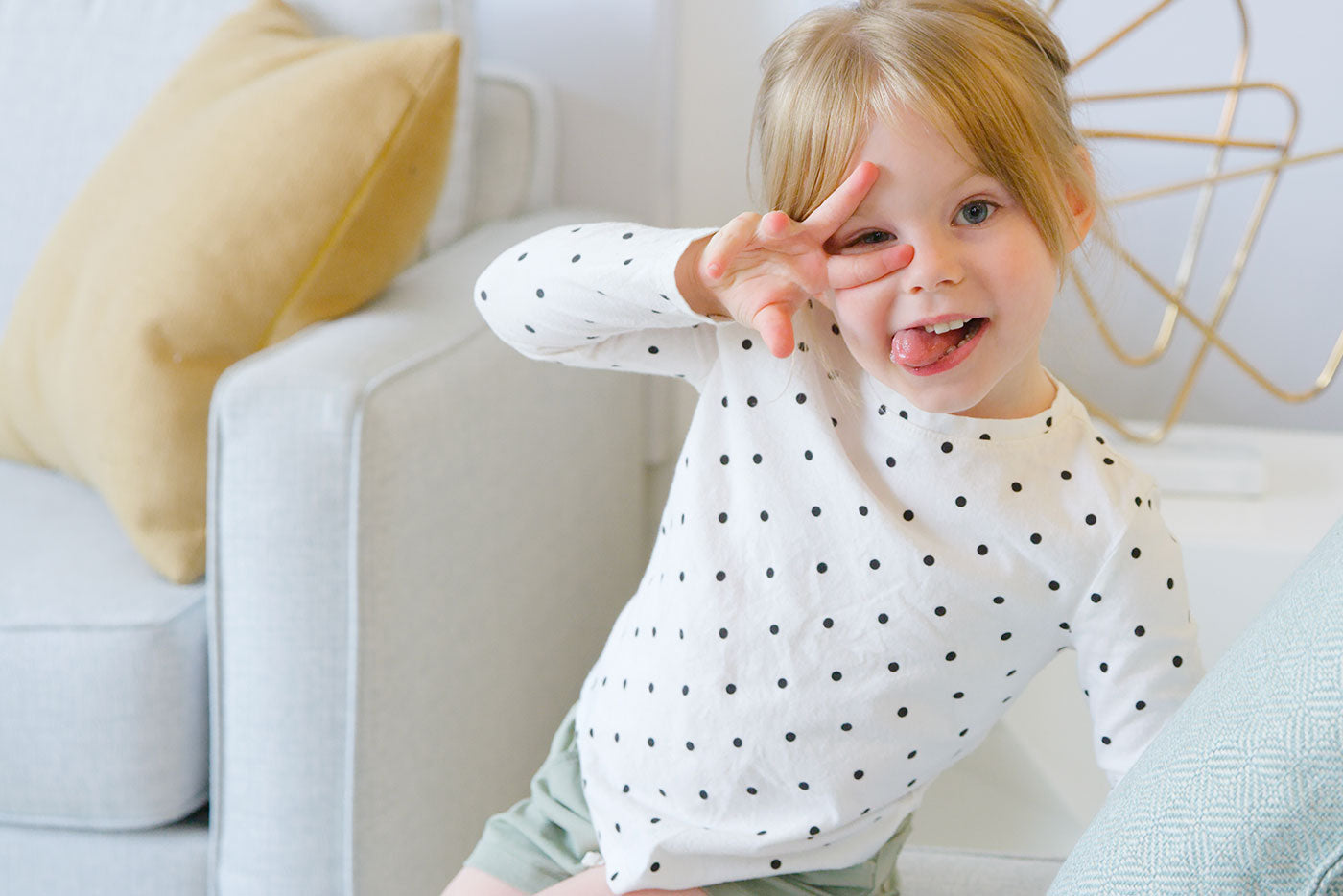
Cultivating Emotional Intelligence in Children: A Comprehensive Guide for Parents
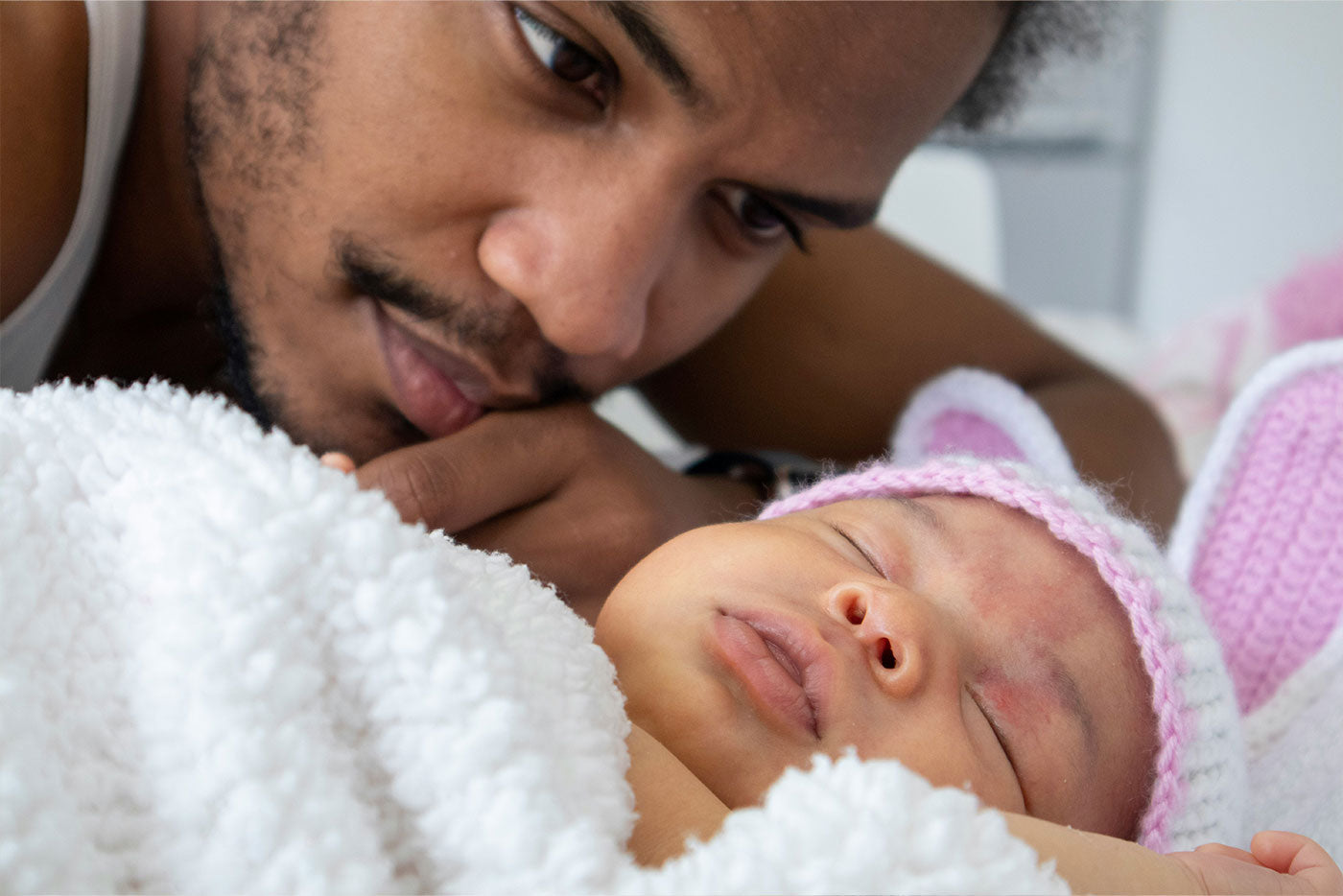
Balancing Breastfeeding and Bottle Feeding: A Father's Perspective
Leave a comment
All comments are moderated before being published.
This site is protected by reCAPTCHA and the Google Privacy Policy and Terms of Service apply.
Designed in Vancouver
Our products are designed in Canada by our team of real parents with real problems
Free shipping over $99
Free tracked, expedited shipping to Canada and the contiguous U.S. for orders over $99
30 day returns
Changed your mind? Return unopened items up to 30 days after purchase, no questions asked
Real human support
Our real life support team will bend over backwards for you, day or night
Spend $500 and get a $25 Strolleria e-gift card to use towards your next order! Learn More

- Dagne Dover
- Travel Systems
- Lightweight
- Convertible
- Nuna MIXX Next
- UPPAbaby Vista V2
- Veer Cruiser City Wagon
- Bugaboo Donkey5
- Bugaboo Butterfly
- Bassinets & Stands
- Parent Organizers
- Travel Bags
- Snack Trays
- Weather Shields
- Infant Car Seats
- Convertible Seats
- All-in-One Car Seats
- Booster Seats
- Nuna PIPA RX
- UPPAbaby Aria
- Car Seat Bases
- Car Seat Adapters
- Home & Play
- Cribs & Bassinets
- Nursery Storage
- High Chairs
- Bouncers & Swings
- Playards & Travel Cribs
- Bikes, Trikes, & Scooters
- Crib Mattresses & Bedding
- Gliders and Rockers
- Stokke Tripp Trapp High Chair
- UPPAbaby Remi Playard
- BabyBjörn Bouncer Bliss
- Dadada Soho 3-in-1 Convertible Crib
- Oilo Flynn Nursery Recliner
- Pacifiers & Teethers
- Changing Pads
- Baby Monitors
- Sound Machines & Lights
- Diaper Bags
- Stroller Guide
- Single-to-Double Stroller Guide
- Travel Stroller Guide
- Infant Car Seats Guide
- Convertible Car Seat Guide
- Jogging Stroller Guide
- High Chair Guide
- View All Guides
- Shop Strollers
- Shop Single-Double Strollers
- Shop Travel Strollers
- Shop Infant Car Seats
- Shop Convertible Car Seats
- Shop Jogging Strollers
- Shop High Chairs
- View All Products
- All Comparisons
- Nuna Comparisons
- UPPAbaby Comparisons
- Compatibility by Stroller
- Compatibility by Car Seat
- Car Seat Installations
- Personal Shopping Experience
- Visit Us In Scottsdale
- Learn About Us
- Check out the Blog

Baby's First Year: A Gear Guide for Every Milestone
The initial year of a baby's life is brimming with captivating milestones. From the rapid transformation of newborns into lively infants to the emergence of bustling toddlers, the journey unfolds swiftly. Seasoned parents consistently offer the same advice to expectant parents: "cherish every moment!" To navigate through the first year with grace and maximize joy for both parents and baby, being equipped with suitable gear tailored to each developmental stage is paramount. The right gear facilitates a seamless journey, allowing you to pause, appreciate, and fully immerse yourself in every precious moment.
Whether you're compiling a registry, strategizing to secure all the essentials before your baby's arrival, or budgeting for ongoing baby gear purchases throughout the year, it's crucial to have a precise understanding of what you'll need and when you'll need it. This article will zero in on the key items parents will require for each stage of their baby's development in their first year.
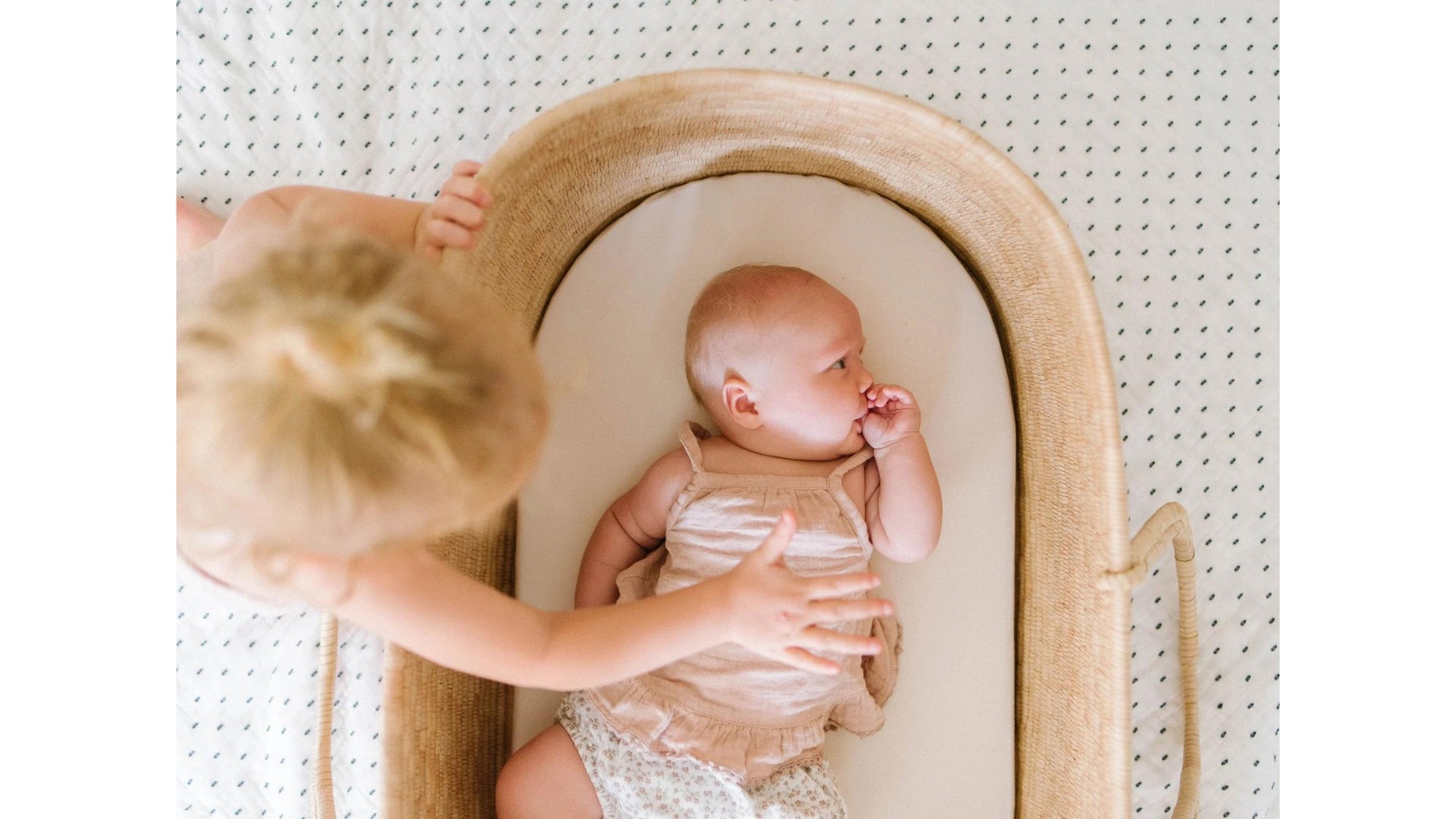
What milestones will my baby achieve in their first year? Birth to Toddler:
Birth to 3 months
- Uses arms to push up during tummy time
- Lifts and hold up head during tummy time
- Open and close hands
- Reach for toys while on back
- Neck control developed
- Sits by using hands for support
- Begins to roll over
- Can stand with support
- Reaches for toys during tummy time
- Can hold and grasp toys
- Begins to show interest in food
- Introduced to first foods - pureed cereal
- Sits up unsupported
- Begins to crawl
- Begins to pick up small objects
- Begins basic understanding of words
- Introduced to pureed veggies and fruits
9-12 months
- Can pull up to standing position, walks supported by "crusing"
- Stands independently
- Claps hands
- Enjoys listening to songs
- Begins to talk with a few words
- Starts to eat independently with fingers
- Begins to eat real food (soft, mashed)
- Introduced to cup
- Around 12 months begins to walk independently
- Begins stacking objects
What baby gear will I need to have ready from the day baby arrives? Newborn Essentials:
When preparing for the arrival of baby, parents can take comfort in knowing that certain items can be acquired gradually throughout the first year as baby grows and achieves new milestones. However, there are numerous essential items that parents should ensure they have on hand from the very day their baby arrives. Let's explore these newborn essentials:
Infant Car Seat (birth to about 12 months):

A newborn-appropriate car seat is the most crucial item to have prepared for use before the baby arrives. Hospitals conduct a car seat fit test on the day the baby is scheduled for their homecoming. Since parents cannot leave the hospital without the right car seat, this item becomes a mandatory must-have.
Most parents opt for an infant car seat, typically used from birth for about one year. Although the period of use for an infant car seat is relatively short-lived, it's favored for its convenience. Only infant car seats can be seamlessly paired with a stroller to create a "travel system," enabling smooth transitions while on the go and during transportation. Moreover, infant car seats allow parents to remove the baby from the vehicle while still contained in their car seat, which is particularly useful during colder months in chilly climates, allowing parents to keep babies bundled while transferring in and out of the car.
- To learn more about the best infant car seats refer >>> here
Convertible Car Seat (birth to about 5 years old):
While infant car seats provide convenience, many convertible and all-in-one car seats are also suitable for use from birth. If you won't be contending with cold weather and stroller compatibility isn't a priority, convertible and all-in-one car seats make excellent investments because they offer extended usability compared to infant car seats. Equipped with infant inserts, these seats ensure a snug fit for newborns and feature adjustable settings to accommodate growth from birth to about 5 years old.
- To learn more about the best convertible car seats refer >>> here
Newborn Stroller (birth to about 4 to 5 years old):
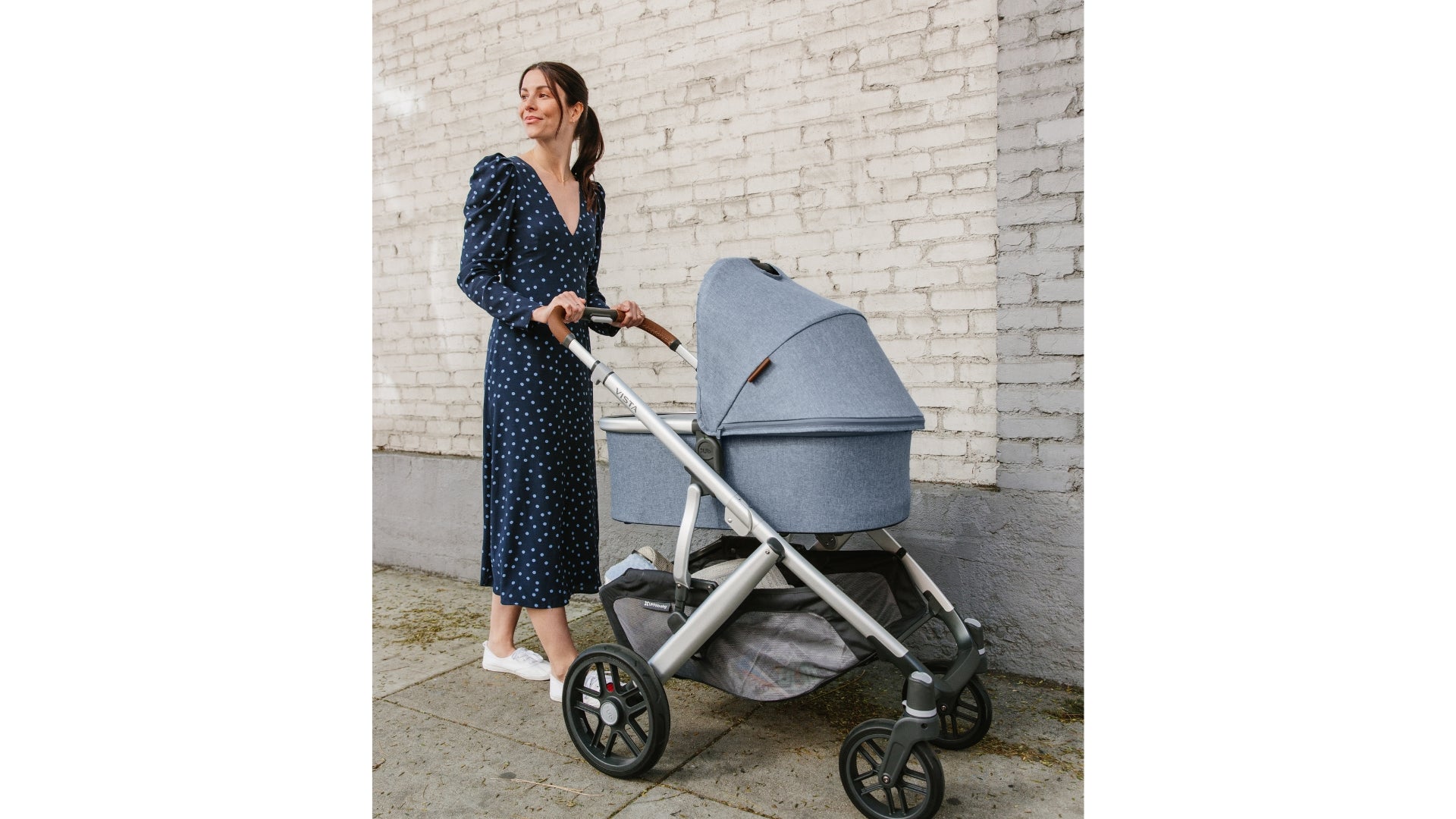
A stroller typically ranks high on every parent-to-be's list of essentials. It serves as the primary mode of transportation for baby, whether it's for leisurely strolls around the neighborhood, quick errands in and out of the car, or, for urban families, even as the main means of transportation. While focusing on finding the best stroller that suits specific lifestyle needs is crucial, it's equally important to choose one that provides the optimal environment for a newborn.
While infant car seats offer efficiency as travel systems when paired with a stroller, they are not recommended for extended periods of use. Newborns should ideally lie flat as much as possible to promote proper spine development and ensure open airways. Therefore, selecting a stroller designed for use from birth, featuring either a bassinet attachment or a fully flat recline, is the best choice for baby's well-being.
- To learn more about the best newborn strollers refer >>> here
Bassinet (birth to about 6 months):

A bassinet is the recommended primary sleep system for newborn babies. While both a crib and a bassinet are suitable for overnight sleep from birth, having baby sleep in the same room as parents significantly reduces the risk of Sudden Infant Death Syndrome (SIDS). A bassinet is often the best fit bedside.
In addition to the safety aspect of room-sharing with your newborn, it also provides undeniable convenience for late-night feedings and diaper changes. Bassinets create a cozy environment that may feel more familiar and comforting to babies, resembling the snugness of their mother's womb.
Many stroller brands provide sleep-rated bassinets that serve dual purposes for both stroller use and as a primary sleep system. It's crucial to recognize that these bassinets must be paired with their corresponding stand to ensure airflow through the bottom, which is what qualifies them for overnight sleep.
Another excellent alternative to a traditional bassinet is a travel crib or play-yard that includes a bassinet function.
- To view our full bassinet assortment refer >>> here
Baby Lounger/Bouncer (birth to about 6 months):
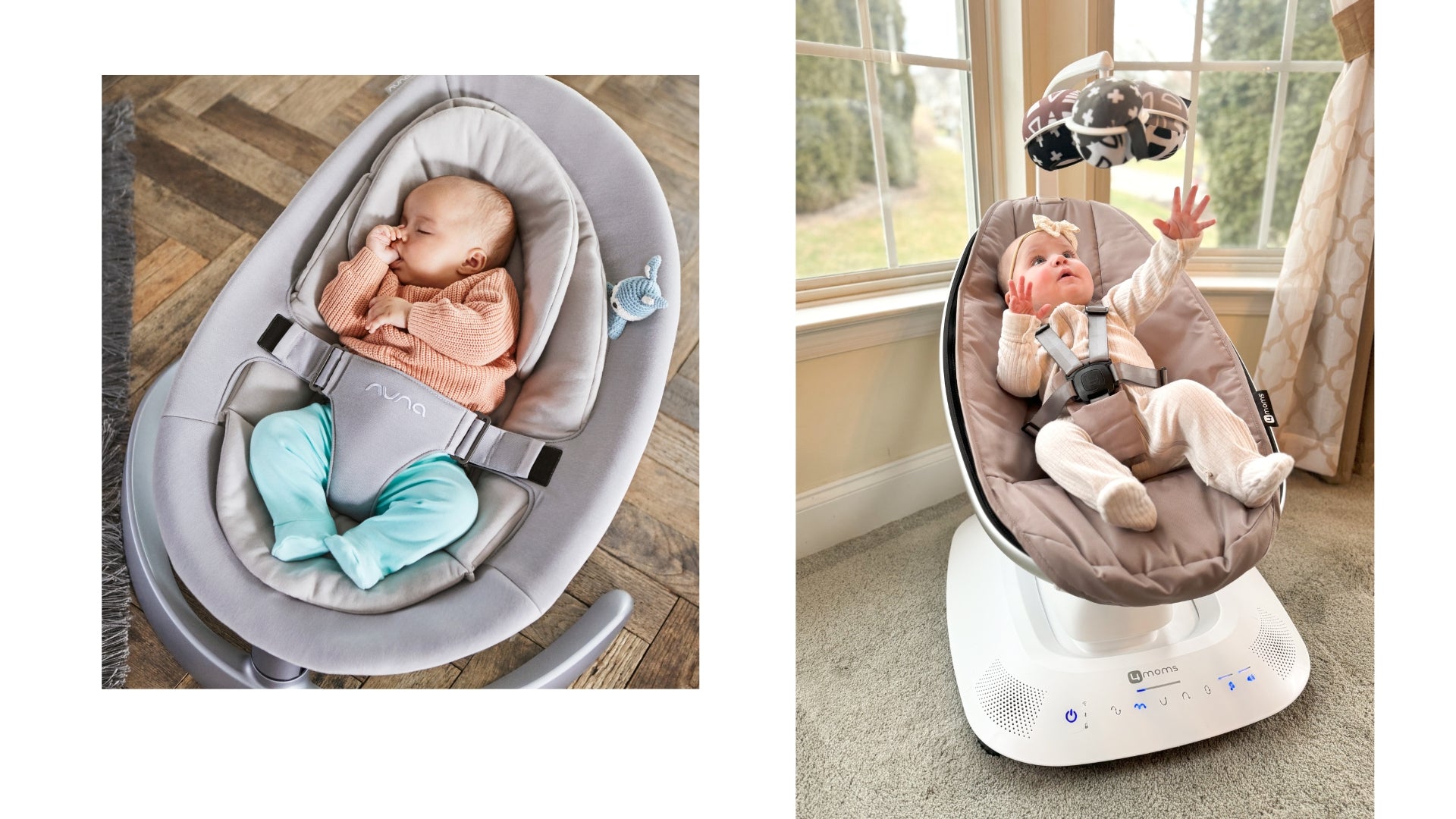
Baby loungers provide significant convenience for parents and engagement for infants. While bassinets are ideal for overnight sleep and napping, parents can't always hold their baby every moment they are awake. Baby loungers offer the perfect spot for babies to "hang out" with the rest of the family.
These baby seats position infants in a more upright position, allowing them to observe their environment and interact with their loved ones while parents can keep their hands free to attend to daily tasks. There are various options available, including baby loungers, bouncers, and swings. Some are heavier and serve as more permanent fixtures in living or family rooms, while others are more portable, allowing them to be easily moved from room to room so that the baby can remain close by.
*Once babies can sit up unsupported (around 6 months) baby lounger use should be discontinued.
- To view our full baby lounger assortment refer >>> here
Activity Arch (birth to about 1 year old):
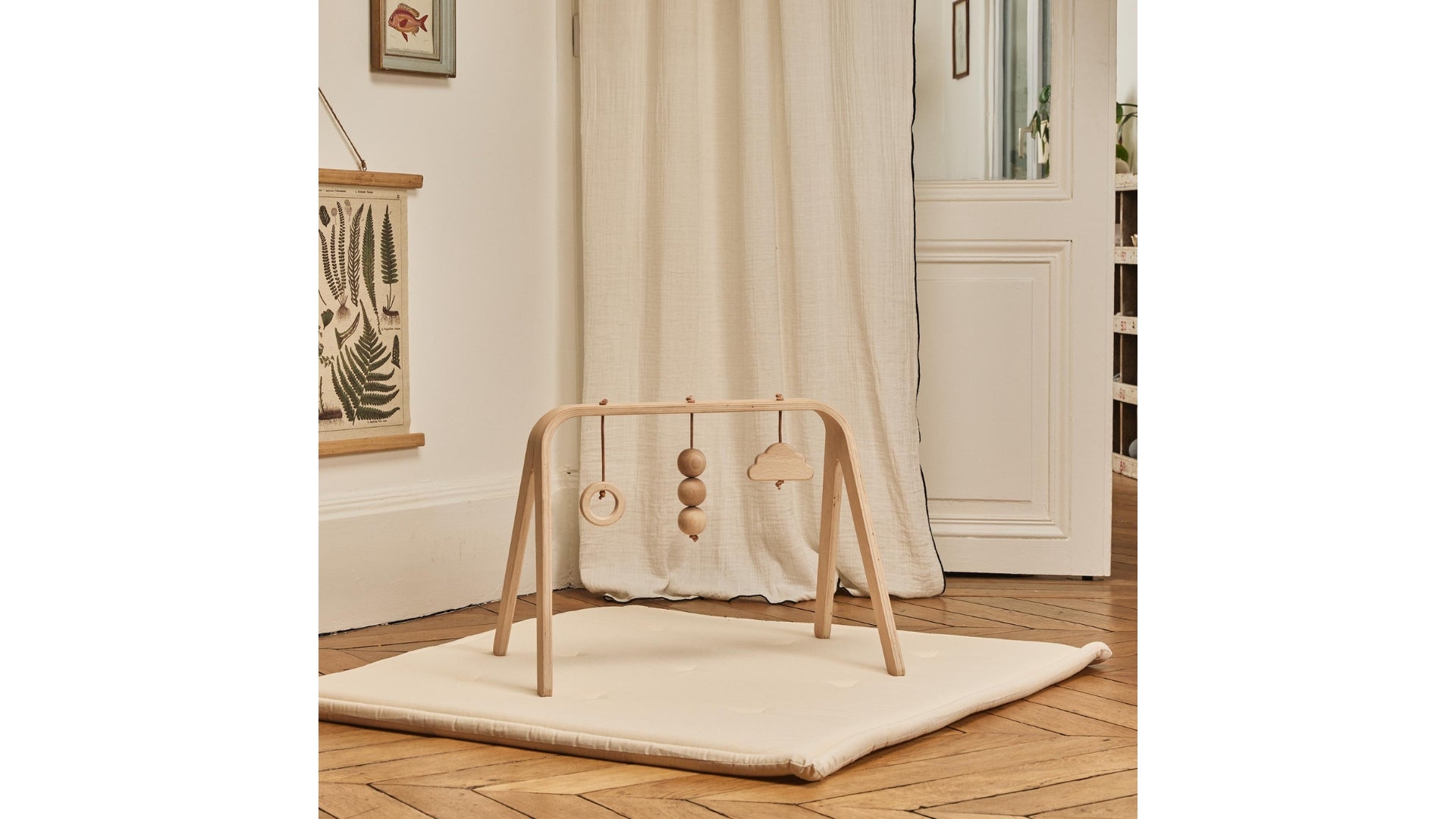
Activity gyms are designed to stimulate curiosity and enhance motor skills. While newborns may not be very mobile and aren't yet ready to play with toys independently, activity gyms prove to be excellent tools for floor and tummy time. Facilitating tummy time is crucial for a baby's neck control development. By placing the baby under activity gyms, they are encouraged to look up and engage. Even while lying on their back beneath these gyms, babies will begin to reach up and interact with the fun and captivating hanging toys, fostering early sensory exploration and motor skill development.
Activity gyms:
- Charlie Crane NAHO Activity Arch
- Tiny Love Boho Chic Luxe Developmental Gymini
Other key items to have for use from birth:
- Bathtub - shop >>> here
- Baby Carriers - shop>>> here
- Changing Pad - shop >>> here
- Diaper/Changing Bags - shop >>> here
- Pacifiers - shop >>> here
- Sound Machines and Night Lights - shop >>> here
What gear do I need for my 6 month old baby? Infant Essentials:
At 6 months, infants undergo significant developmental changes. At this stage, babies become more engaged, start grasping toys, sit up on their own, roll over, and are ready to be introduced to food. With these milestones come a new set of gear needs to support their evolving abilities and activities.
Crib (6 months and up):
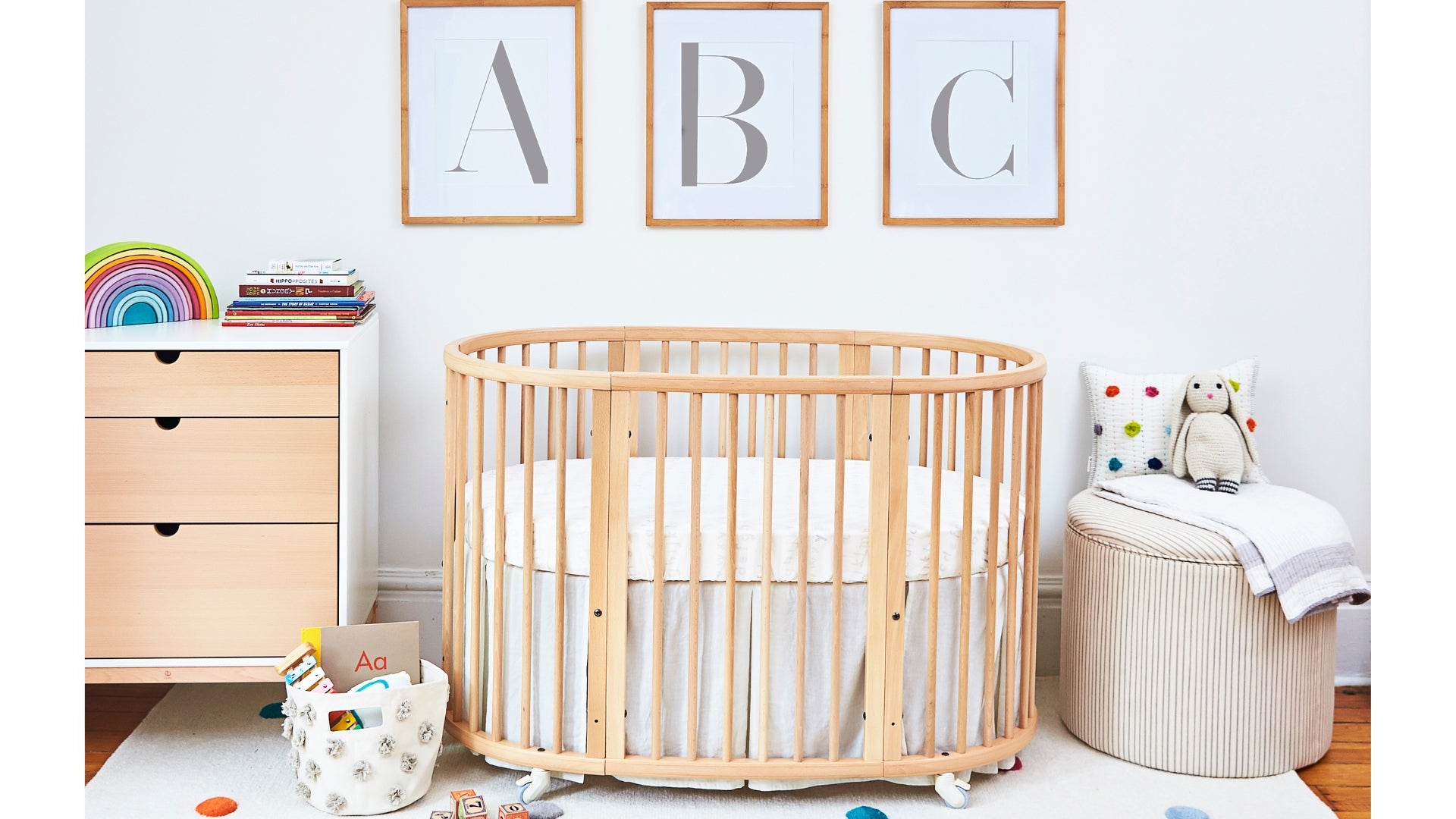
If a bassinet has been used since birth, it's typically recommended to transition the baby to a crib at around 6 months of age. Even if the baby still appears comfortable in their bassinet, by 6 months, babies often start pulling themselves up to a seated position, making the bassinet unsafe. Therefore, moving them to a crib becomes necessary.
Furthermore, it's important to note that purchasing a new crib will also necessitate the acquisition of a crib mattress. Opting for a convertible crib is a wise investment choice. These models can initially function as a traditional crib and later be converted into a toddler bed. Some even offer the flexibility to convert from a toddler bed to a junior or full-size bed, ensuring utility for many years to come.
- To view our crib assortment refer >>> here
- To view our crib mattress assortment refer >>> here
Activity Center (6 months and up):

At this stage, babies have typically outgrown their baby loungers and are seeking more stimulation. Activity centers become essential, captivating infants with an array of toys attached to the system, offering diverse ways to engage and play. These centers feature a seat that holds the baby in a standing position with their feet anchored at the base of the system. While the baby may not yet possess the strength and balance to stand independently, these systems aid in strengthening their legs, laying the groundwork for their first steps.
Activity Center:
- Tiny Love Magical Tales Stationary Activity Center
Highchairs (6 months to about 3 years):
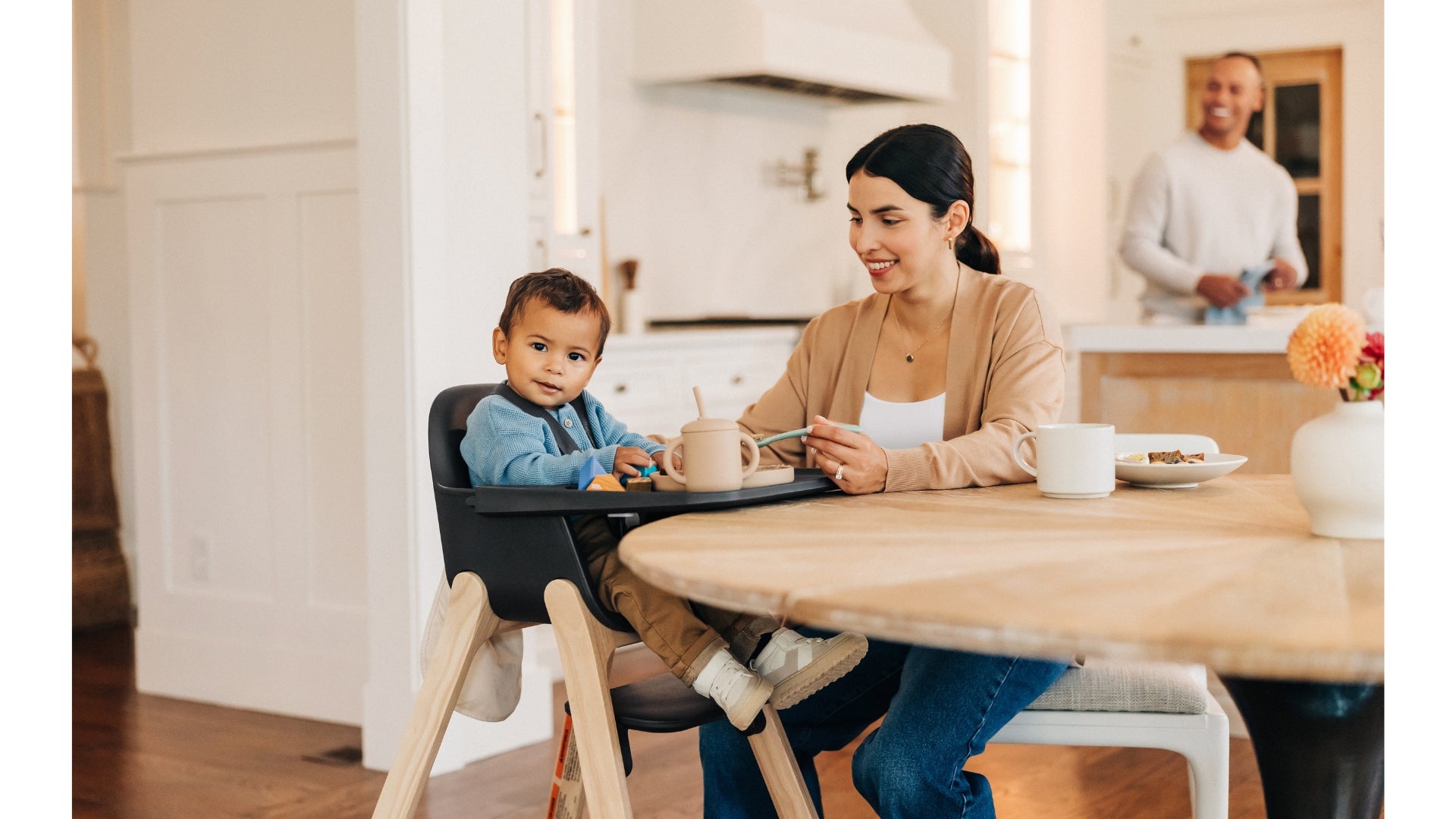
Infants typically start their food journey with cereal, progress to pureed veggies and fruits, and eventually move on to diced, mashed, and soft foods. Highchairs become an essential piece of furniture for the family dining room or kitchen. Many modern highchairs are designed to pull right up to the family dining table, allowing babies to be included at mealtime. This fosters family bonding, in contrast to traditional highchairs that often leave baby somewhat isolated.
- To learn more about the best highchairs refer >>> here
Highchair Accessories and Feeding Gear (6 months and up):
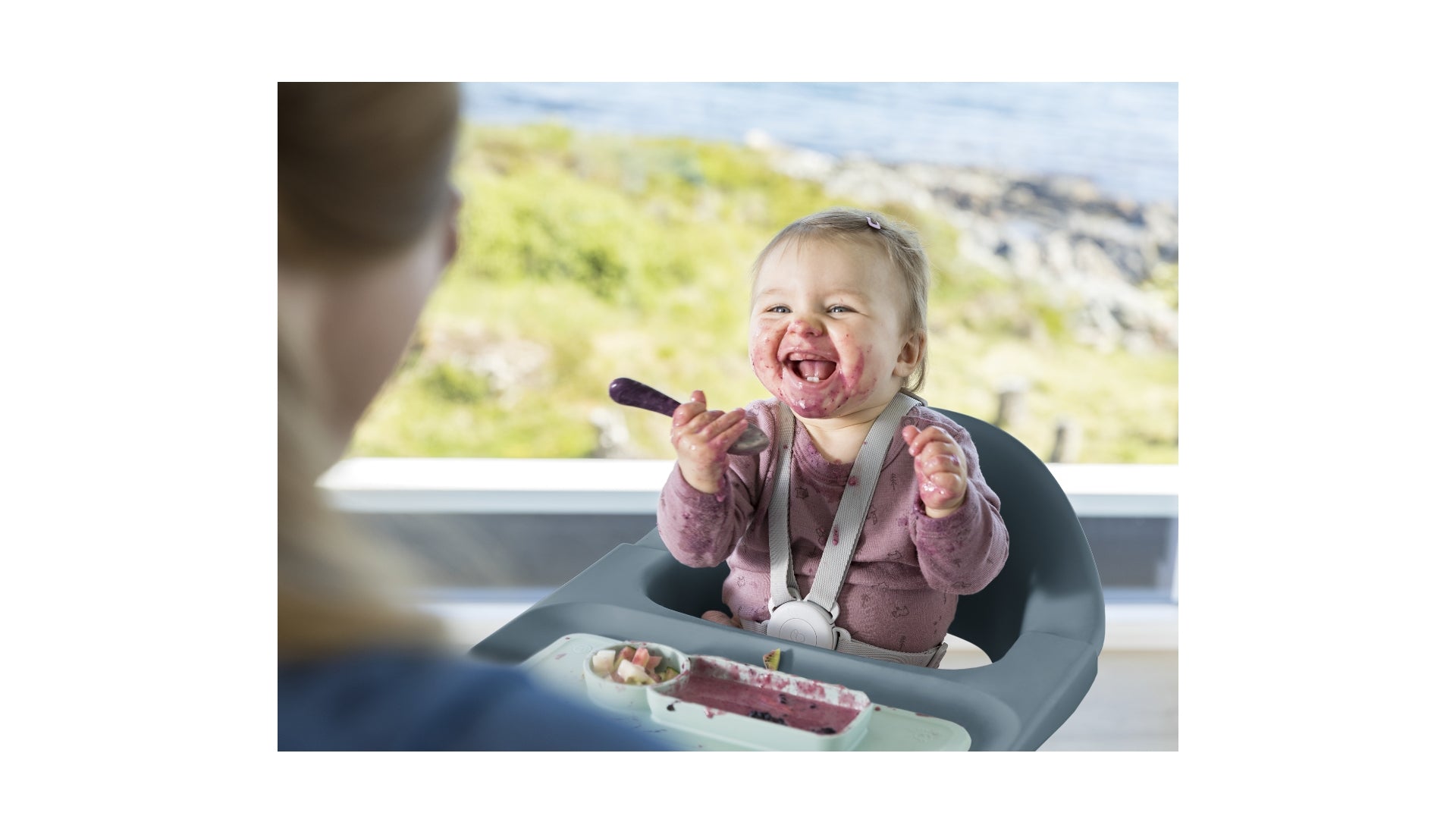
The introduction of food also entails the need for baby-friendly feeding gear! We highly recommend ezpz products. Both infants and toddlers seem to find it amusing to dump their plates of food, but ezpz has parents covered with plates and bowls that suction securely to either a highchair tray or directly to the dinner table, making it a challenge for little ones to create giant messes!
- Shop ezpz products >>> here
Playard (birth to about 2 to 3 years):

Although we briefly discussed the option of using a travel crib or playard with a bassinet mode from birth, playards are now emphasized as essential for infants aged 6 months and older. As babies progress through their first year, they become increasingly active and mobile. Playards provide a secure environment for babies to engage independently with age-appropriate toys. Additionally, they serve as convenient travel cribs, making them valuable assets for families on the move.
- To view our Playard assortment refer >>> here
Jogging Stroller (6 months to about 4 to 5 years):
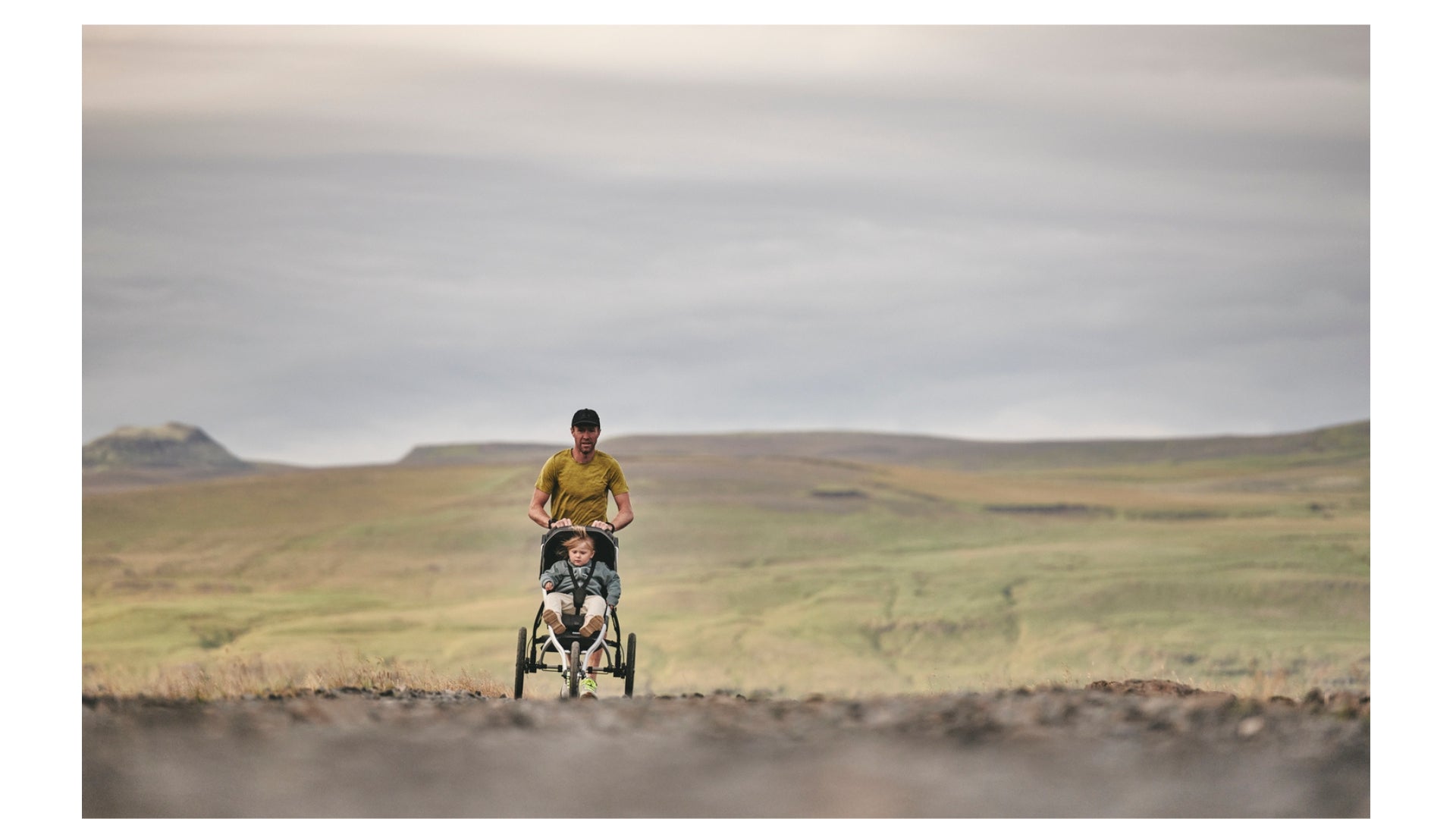
Jogging strollers can be utilized from birth by pairing them with an infant car seat or opting for models that offer a lay-flat recline or bassinet option. However, they are highlighted on our list of gear for use from 6 months and up. This is because at this stage, babies are developmentally ready to join parents for their daily run. It's not advisable to run with newborns, as achieving full neck control is a crucial developmental milestone necessary for safe running with a baby. By 6 months, babies typically have developed full neck control and will be excited to accompany parents with active lifestyles.
- To learn more about jogging strollers refer >>> here
What gear do I need to prepare for my baby transitioning from infant to toddler?
As babies approach their first birthday, their activity and movement steadily increase. At this stage, parents should prioritize acquiring gear that supports the development of fine and gross motor skills, along with compiling a list of toys for baby's first birthday bash! Additionally, with baby's first birthday quickly approaching, it's crucial to start exploring convertible car seat options and prepare for a car seat transition.
Convertible Car Seats (birth to about 5 to 6 years):
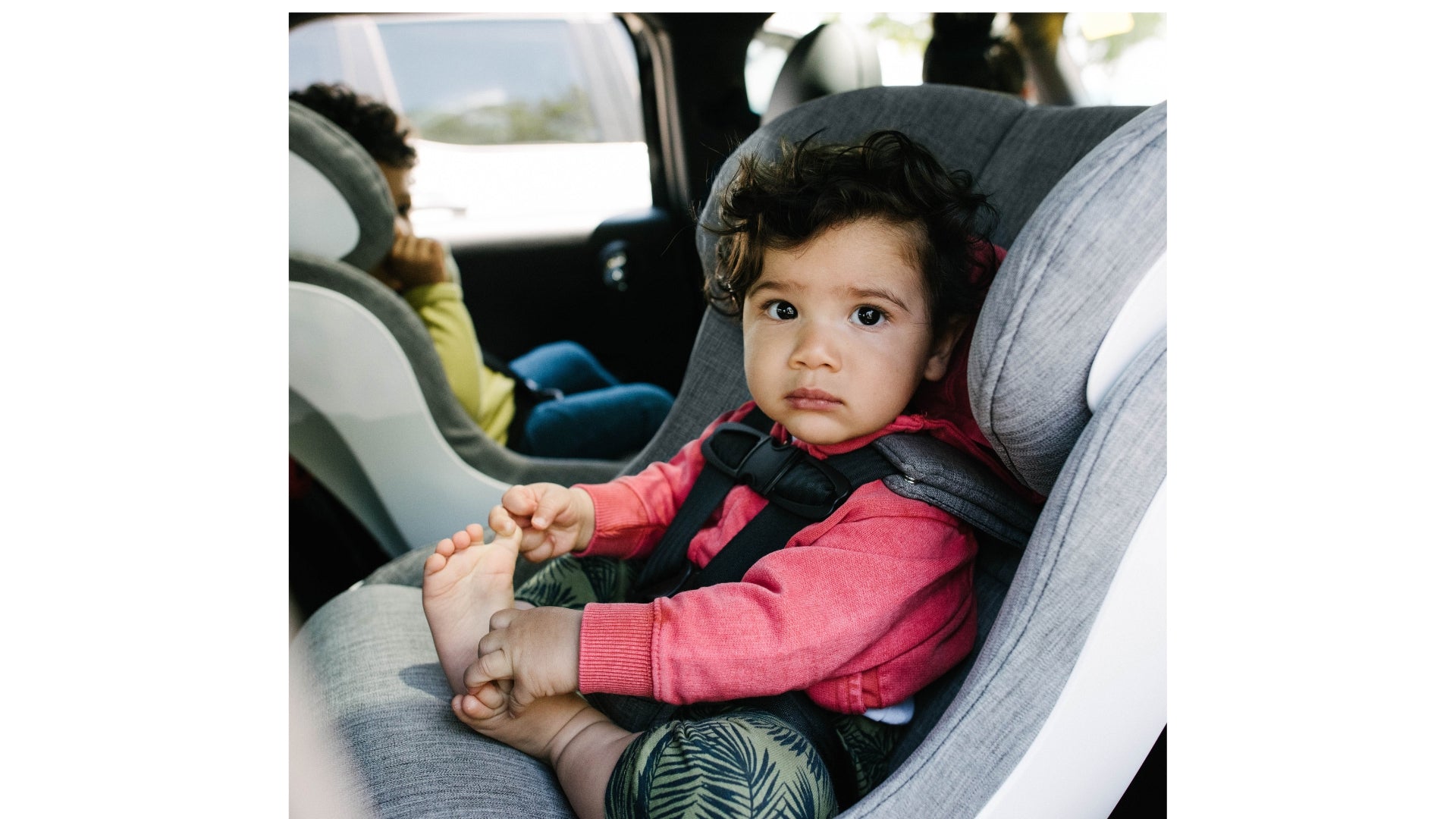
We've previously discussed the option to skip an infant car seat and utilize a convertible car seat from birth. However, for families who initially opted for an infant car seat to begin their journey with their baby, it's time to consider transitioning around the baby's first birthday. Convertible car seats offer rear-facing capabilities, with premium models accommodating rear-facing up to 50 pounds. Although most state laws mandate rear-facing until age 2, it's advisable to keep your child rear-facing for as long as possible. Once the rear-facing limits are reached, convertible car seats can then be installed in a forward-facing position, accommodating children up to either 65 pounds or 49 inches.
Alternatively, all-in-one seats function similarly to convertible car seats but also have the ability to convert to high-back boosters, making them an excellent investment for parents seeking maximum versatility and longevity in their gear.
- To learn more about the best convertible car seats refer >>> here
Stacking and Sorting Toys:
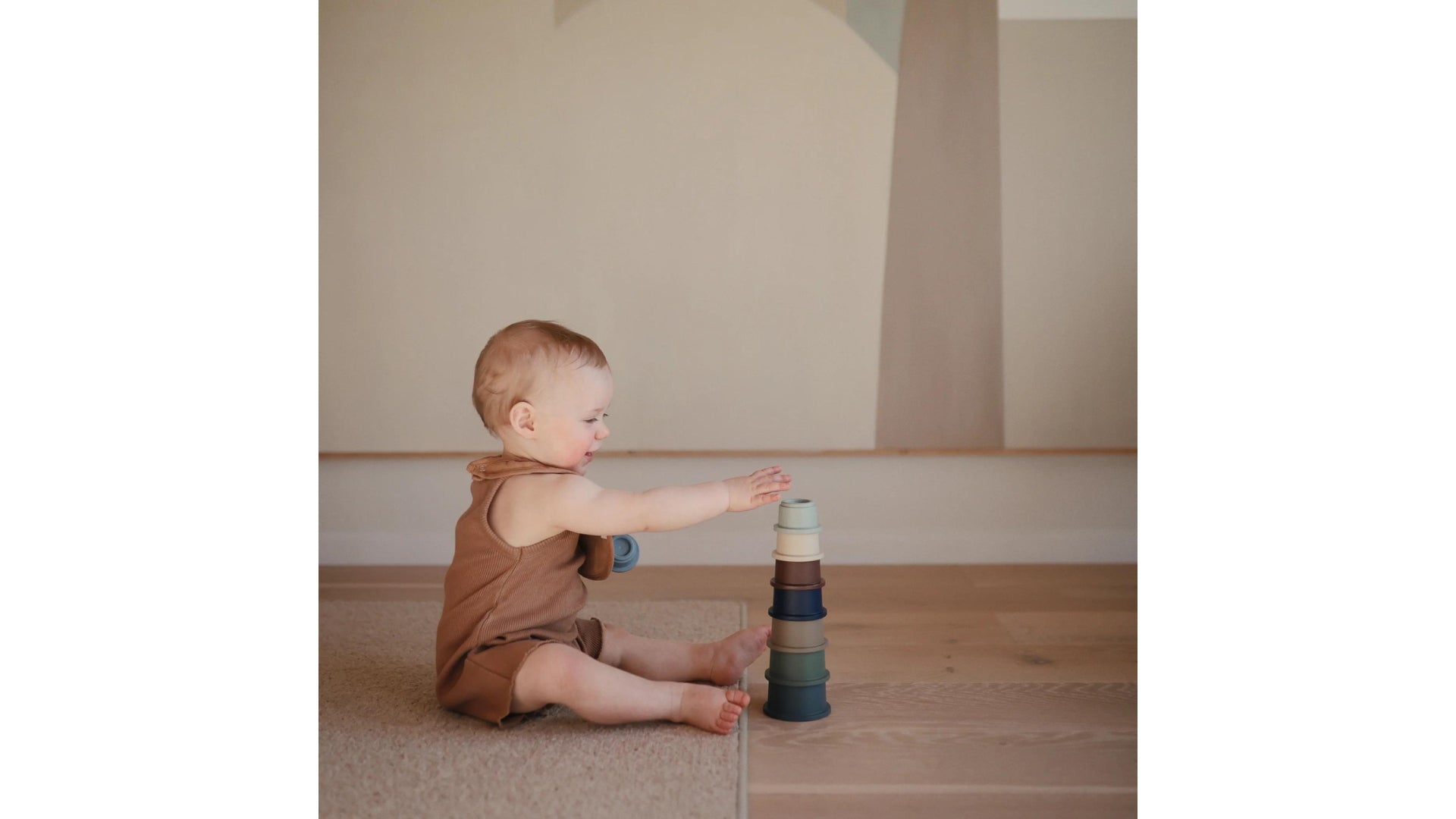
Stacking and sorting toys are essential for a baby's first year. These toys play a crucial role in developing fine motor skills and fostering a basic level of organizational skills.
Check out our favorite stacking and sorting toys:
- Mushie Stacking Cups
- Mushie Stacking Rings
- Mushie Shape Sorting Box
- Mushie Rainbow Stacker
Indoor Active Play:
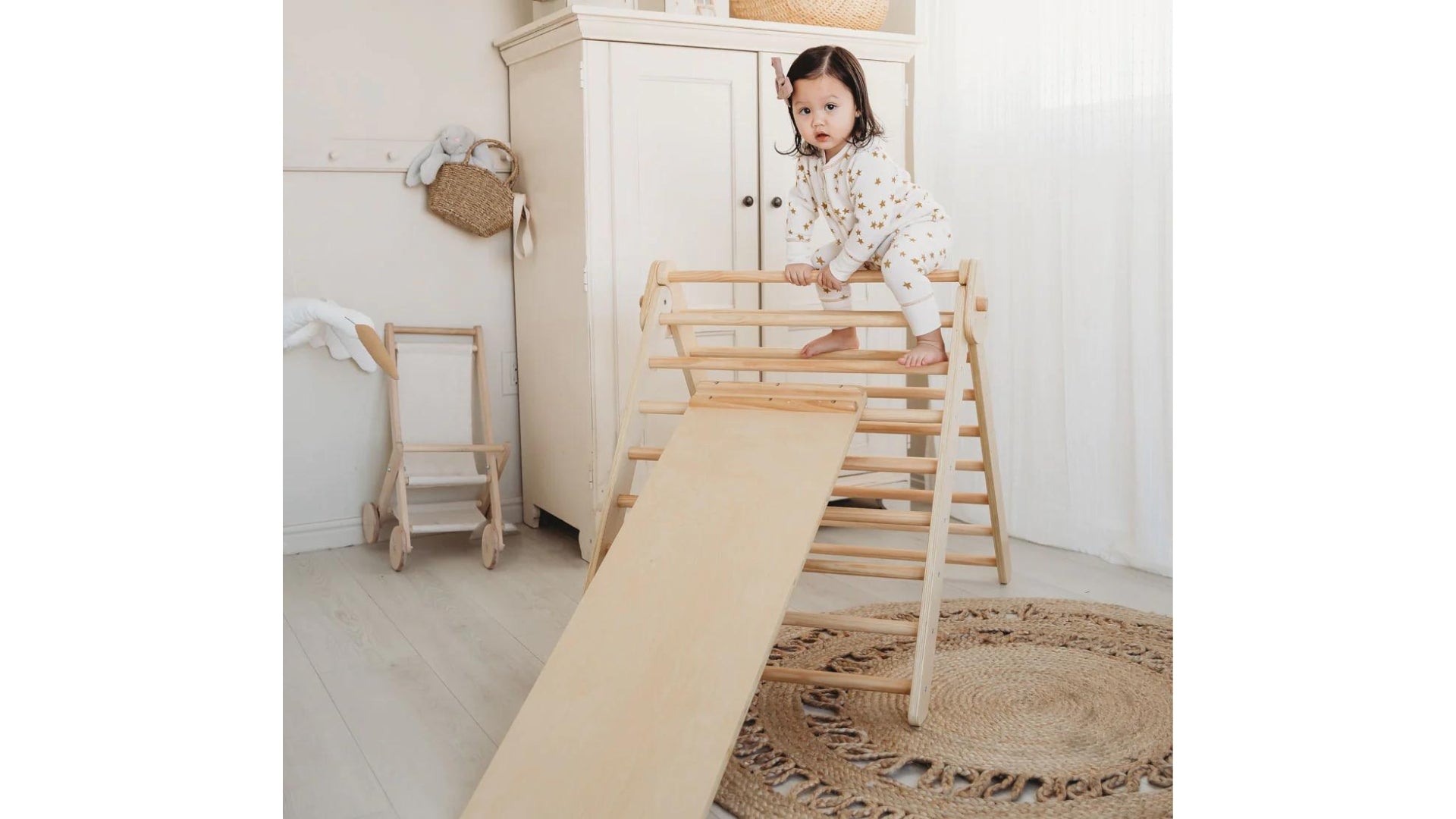
Indoor gyms are ideal for keeping older infants and toddlers entertained. Investing in high-quality indoor play equipment can offer tiny tots hours of entertainment, serving as an outlet for their boundless energy. These setups are specifically designed to enhance balance, coordination, gross motor skills, and imagination.
- Piccalio Climber Pikler Triangle Set
- Piccalio Stepping Stones
- Piccalio Surfer Balance Board
- Piccalio Acrobat Balance Beam
- Wonder & Wise Balance Beam
- Wonder & Wise Stay-at-Home-Play-at-Home Indoor Gym
- Wonder & Wise Mini Mighty Indoor Gym
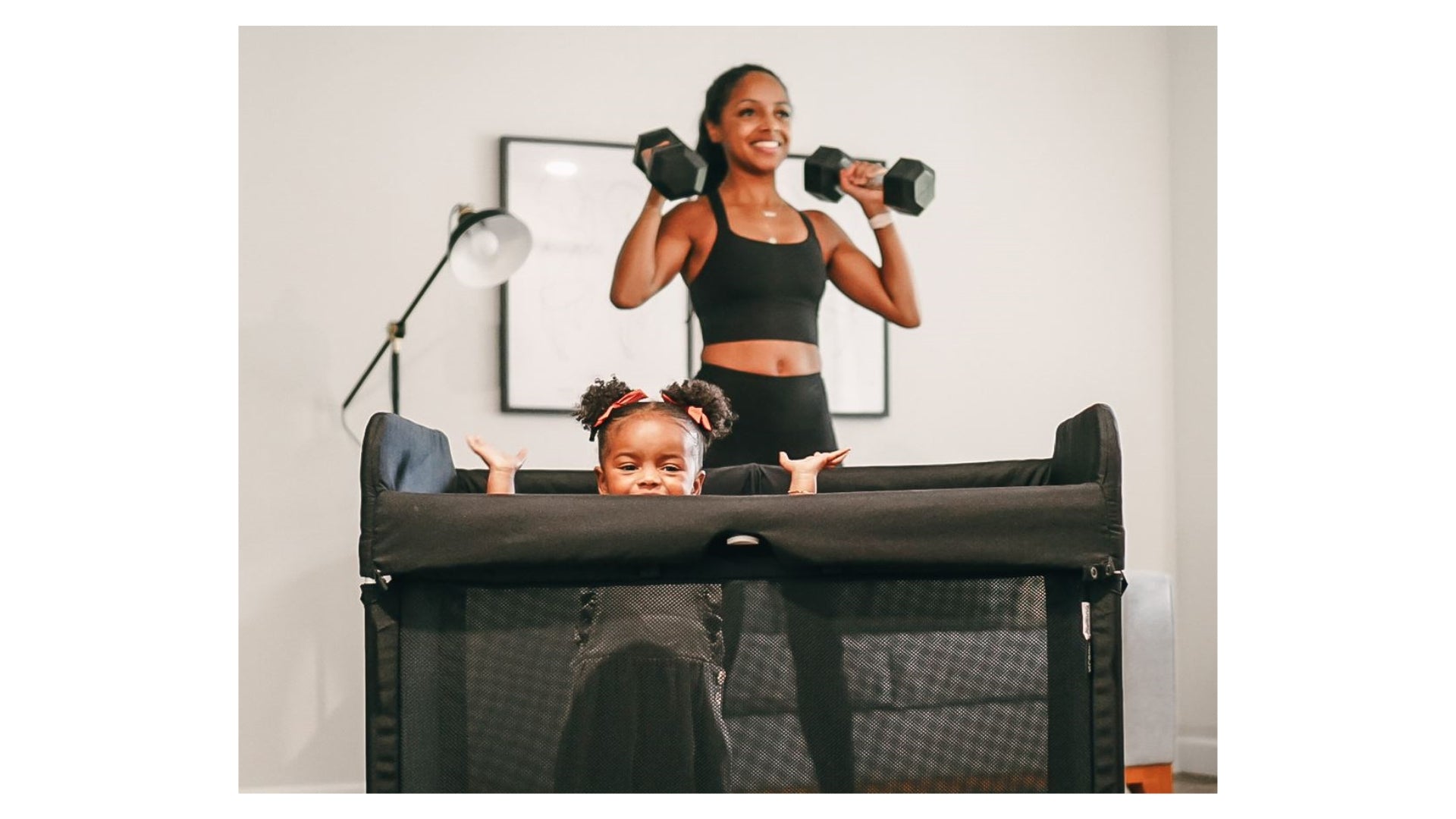
Having a clear understanding of your baby's developmental milestones during the first year and knowing which products will be necessary for each stage is crucial. The items featured in this guide are guaranteed to ensure happy babies and parents, providing the most efficient and enjoyable first year with your baby!
Strolleria is dedicated to making the baby gear buying experience less overwhelming for parents. If you have more questions about essential gear for baby's first year feel free to chat us or email us at [email protected].

Earn 10% back in points on every purchase, then redeem them for a discount!

Talk to an expert via live chat or e-mail to find the gear that's right for you.

Find answers to questions about shipping, returns, compatibility, and more!
Join our e-mail list for promotions, product releases, and more!
Spend $75 more and get free shipping!
Your cart is empty
Free Shipping On Orders of $75 or More

A Complete Guide to Your Baby’s First-Year Milestones
In the initial weeks with your newborn, expect a whirlwind of emotions, exhaustion, and dazzling joy. Your baby will sleep for the most part, waking up every two to three hours for feeding. While it’s a period of rapid growth, newborns are fragile and require careful handling, especially while bathing and feeding.
As overwhelming as it might seem, the details in this complete guide to your baby’s first-year milestones can help. You will find time to sleep again once your child figures out how to sleep through the night. These days will seem long as they are happening, but you will cherish them once they’re gone.
Physical and Behavioral
The joyous journey of parenthood continues as your little bundle of wonder embarks on its first of many milestones. Each moment is a cherished memory, from the endearing first smile to the delightful first words. Their first tentative steps and charming curiosity make each day a celebration of growth and love.
Usually, the first genuine smile from your baby, often referred to as the “social smile,” graces your life between six and twelve weeks. This heartwarming milestone is your baby’s first way of communicating enjoyment and interest, a beautiful moment to witness as a parent.
Rolling Over
Expect another delightful milestone around 3 to 5 months as your baby grows—the first rollover. This thrilling moment is your little one’s first step towards mobility. Be ready with your camera; these initial clumsy yet determined attempts at rolling are precious moments you’ll want to capture!
Another fascinating milestone to await with bated breath is when your little love bundle begins to crawl, typically around 6 to 10 months. This delightful progress heralds a new era of exploration for your tot as they start to navigate the world confidently.
Keep the fluffy pillows and rugs handy for those unforgettable, heartwarming moments when your baby brazenly explores their living quarters for the first time.
The first time your baby starts to babble, usually around 6 to 9 months, is an enchanting symphony of sounds and expressions that melts your heart. Their adorable little noises, filled with pitches and intonations, are their initial attempts at communicating with you. This precious moment, which marks their first steps into the linguistic world, exudes an alluring appeal that may transform even the most routine of days into something worth remembering.
After weeks of pulling up on the furniture and scaling it, a baby may take their first independent steps between 9 to 12 months. However, every child is unique; some may start walking as early as 8 months or as late as 18 months. These first steps signify a momentous leap in your baby’s growth journey and exploration. Be ready with your phone and tissues; these moments of achievement will bring joyful tears to your eyes.
Fostering Development
Consider incorporating educational toys into their playtime. These toys can significantly enhance cognitive and gross motor skills. Outdoor play is another powerful stimulant for physical and mental development, providing experiences that foster creativity and problem-solving.
Finally, reading aloud to your kids is a great way to connect with them and help them learn to read and write. It broadens their horizons, trains their ears, and plants the seed for a lifetime love of reading.
There’s a good chance toys and nightly story time will excite their minds and pique their curiosity enough to hit these first-year milestones even quicker.
Feeding Time
Breastmilk or formula is crucial for the first six months when it comes to feeding your baby. The exact amount varies with each baby, but on average, they will need about 2.5 ounces of formula per pound of body weight daily until they’re about six months old. Feedings may be more frequent for breastfed babies because it’s more digestible.
Introducing your baby to solid foods around six months of age is standard. Start with breast milk or formula and iron-rich meals like rice cereals. Introduce pureed meats, veggies, and fruits gradually. It’s crucial to understand that solid meals are supplementary to breast milk or formula, which will remain their major nutrition source unless your child’s pediatrician says otherwise. Always consult them before you make any changes to their diet and feeding schedule.
Sleeping Habits
Most of your readings and internet searches within the first year will likely have to do with sleep schedules and establishing the best routine. Despite all your efforts, your baby will surprise you. So, what can you expect from your little one?
As the weeks pass, your newborn, who once awoke every few hours, begins to sleep longer. Many babies start sleeping for five or six consecutive hours around three months old, a milestone worth celebrating by taking a well-deserved nap.
As you approach the six-month mark, nighttime sleep may extend to nine or ten hours. This momentous shift is a testament to your baby’s growing body and mind. Around their first birthday, most babies sleep for about 11 to 14 hours throughout the day, non-consecutively.
Don’t forget that each child is unique, and patience is key during this tender phase of dreamy slumbers and midnight awakenings.
Social Interactions
First interactions with other babies can begin around six months, once your little one’s immunization schedule is well underway. This timing is generally safe for them to start socializing. Initially, these interactions will be more about parallel play—each child playing separately but within each other’s vicinity.
Even if they aren’t interacting directly, they still pick up valuable life lessons like sharing, nonverbal communication, and imitation. While some may love social contacts from the get-go, others may take a little longer to warm up. You should never force your infant to do anything against their will. Regular playdates or baby groups may help ease infants into this exciting new stage of development.
Let love guide your steps, and let patience be your companion. Embrace each day, each moment, and each milestone with joy and gratitude. These precious times are fleeting and will soon transform into memories. Take a deep breath, soak in your baby’s growth journey, and know that you are the perfect parent for your little one. After all, love is the most essential ingredient in raising a happy, healthy, and confident child.
Our plush stuffed animals at Bunnies by the Bay make great, cuddly companions for your child as they conquer each milestone. With their sweet little faces and snuggly soft material, they’ll likely be your little one’s comfort object for years!

Leave a comment
All comments are moderated before being published
This is the United Kingdom website

The Journey to Your Baby’s First Steps: What Parents Should Know
The first year of life is a remarkable period in your baby's development. in just a short time, they transform from a helpless newborn into a walking toddler. those first steps are unforgettable, marking the beginning of a new world of learning and exploration..
The Complexity of Walking Walking is a complex skill that involves many changes in the body and brain. While the exact reason humans walk upright is still debated, it is believed to be an evolutionary response to changing environments. Several factors influence when a baby takes their first steps, including genetics, environment, care quality, exercise, and nutrition. However, there is no evidence that early walking boosts intelligence. In fact, early walkers might skip mastering crawling, which is crucial for brain development and future skills like reading and writing. Early Preparation for Walking Even before birth, babies practice walking movements. These early activities help develop the motor cortex of the brain and build muscles needed for walking. Newborns also display a stepping reflex if held upright, making coordinated walking motions. Practicing this reflex can help prepare them for walking later on. Key Developmental Milestones Head Control: The first milestone is gaining control over the head. This develops the neck muscles and brain connections needed for future movements. Shoulder and Upper Body Strength: Babies develop upper body strength by lifting and turning their heads, especially when placed on their tummies. This is followed by rolling over and eventually sitting up, which expands their visual range and frees their hands for exploration. Crawling: Various crawling styles emerge, but hands-and-knees crawling is particularly effective for building coordination and stability. Standing and Walking: Babies eventually pull themselves up and stand. Walking begins once their legs are strong enough to support their weight, driven by the need to use their hands freely. Encouraging Walking To help your baby learn to walk: -Encourage them to walk towards you by kneeling and holding out your hands. -Let them go barefoot to improve balance and coordination. -Help them walk on different surfaces like sand and grass to strengthen their muscles. -Provide a toddler truck to support their walking practice. -Allow them to climb on and off furniture to build muscle strength. -Remember, every baby develops at their own pace. Encourage your baby to practice rolling, sitting, crawling, and standing to build the necessary strength and balance for walking.
Adapted from The Enigma of Walking (Physical Development) by Dr Lin Day 2008 (Updated August 2021)
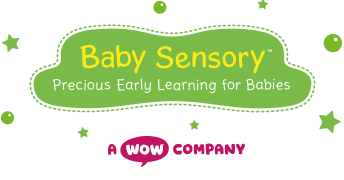
© Wow World Group Ltd. All rights reserved.
Customer information:
- Join our team
- WOW Programmes
- Privacy policy
- Website terms & conditions
Contact us:
The WOW Centre 25/26 Norton Enterprise Park Whittle Road Salisbury SP2 7YS
For all media enquiries, please contact Natalie Sanderson: [email protected]
We’ve done the research; so you can enjoy the fun...

- Projects & Impacts
- Vaccination
- Early Childhood Care
- Public Health
- Pediatric Blogs
- Download the App
Select Page
Baby Milestones: The First Year
Posted by ImmunifyMe | Early Childhood Care
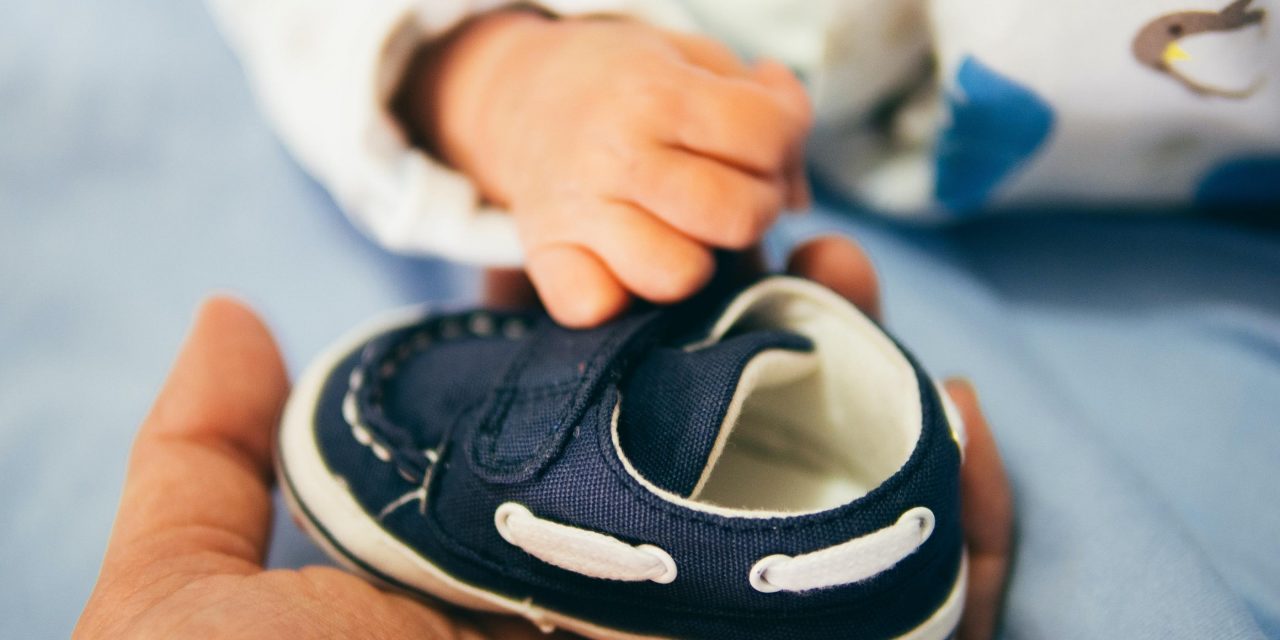
From the moment you first hold your little one in your hands, parenthood is a journey like no other. Like any journey, it has its fill of roadblocks and obstacles, dead ends and smooth sailing. And, just like a journey, it also has its milestones! The first year of your baby’s life is when you’re going to look out for these milestones the most. Being a crucial year of an infant’s development, baby milestones in the first year can help you identify whether or not all is well with your baby. Read on to learn more about these first-year baby milestones.
What To Remember About Baby Milestones
Before we take you to the first of many milestones to expect, here are a few important things to remember. Firstly, remember that these milestones are only guidelines, and you must not use them to come to your own conclusions about your baby’s health. Your baby’s pediatrician will help you accurately measure your child’s development at each visit.
Secondly, you may have to look at a different set of milestones if you have a premature baby, or if your baby has special needs. Children with special needs will often have a separate growth chart of their own. This helps you keep track of their growth at what is their normal rate. Your baby is expected to reach certain milestones not based on the day they were born, but on their due date. If your baby was born two months before their due date, they’re going to reach milestones two months later than the given guidelines.
What Baby Milestones To Expect In The First Year
First Month
At the end of your first month of parenting, you’re going to feel like you need a reward for hitting a milestone of your own! For some of you, this time will go by in a blink, while for others it will feel like a year. Keeping track of time isn’t the easiest when you have a newborn on your hands. However, in this short duration, your baby’s body is already changing to better prepare for life outside the womb.
Some of the baby milestones to look out for in the first month are:
- Moving their hands and fists near their mouths, and closing their fists into a tight ball.
- Developing their senses and reflexes . They may startle at a loud noise, or close their eyes when they see a bright light.
- Turning towards familiar sounds and voices . If you bonded with your baby during pregnancy , they may be able to recognize your voice easily.
- Preferring high-contrast images or patterns.
- Focus on objects that are about 8 to 12 inches away from the face.
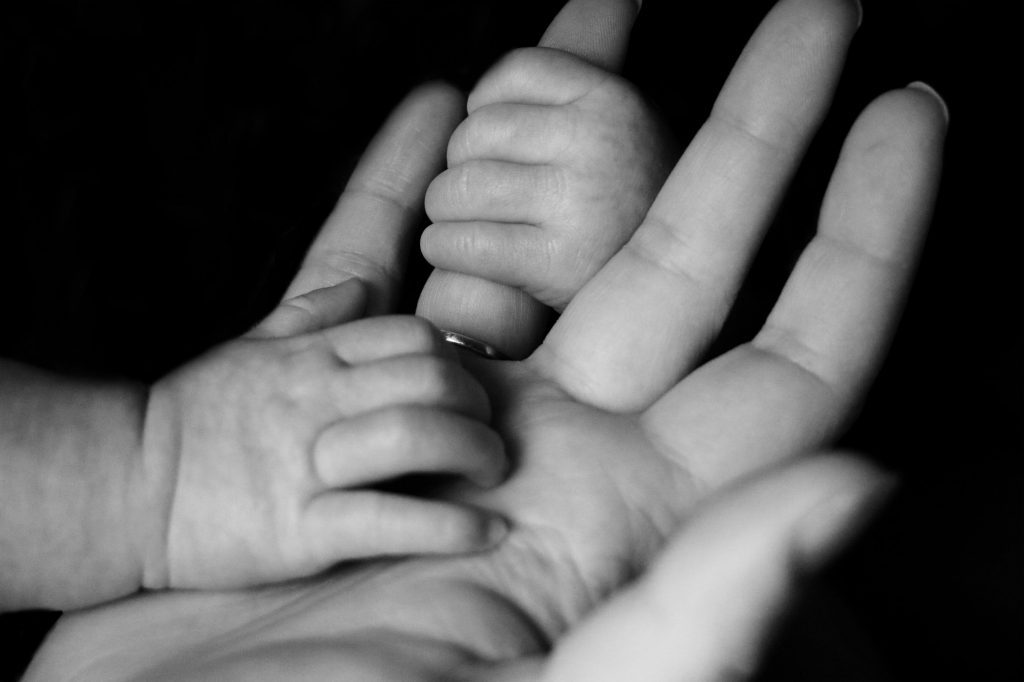
Your newborn is too small for any major movements apart from grasping your fingers.
Second Month
In their second month of life, babies will start to look a little less like newborns and a little more like, well, babies! You’ll notice their faces filling up, features becoming a bit more distinct, and so on . They’re also going to be quite the pooping, sleeping, and crying machines, but this isn’t all. You can expect your baby to be:
- Cooing and gurgling .
- Trying to move a bit by themselves . They’ll probably be pushing downwards with their arms when on their tummy, trying to push themselves up.
- Slowly tracking objects with their eyes. You can encourage them to do this by slowly moving a brightly colored object in front of them.
- Trying to reach out to objects, though not very successfully.
Third Month
By the third month, you’ve settled into a rough routine with your little one. They’re slowly becoming a little independent and can keep themselves occupied for short periods of time. This means you can take those few minutes to nap or exercise without them wailing for you. By the third month, your baby will:
- Coo, babble and giggle, and make vowel sounds (ooo, aaa)
- Smile! Your little one will now smile at you and at the sound of your voice, and especially when you smile widely at them.
- Grasp at toys , rattles and other objects.
- Properly bring their hands to their mouth.
- Raise their head and chest when on their stomachs, and support their bodies with their arms.
- Stretch out their legs, kick and thrash their feet when on their stomach and back.
Fourth Month
Your baby has already started to explore the basics, and the fourth month is when they begin to perfect them. You’ll notice body movements and actions getting better. Some baby milestones that they perfect from this month onwards are:
- Holding their head up better , and for longer.
- Showing more coordination with hand movements , and grasping their toys with more accuracy.
- Copy your facial expressions .
- Starting to roll over , or making obvious attempts to do so.
- Tracking faces and objects with more accuracy .
- Pushing down on their legs when you hold them up.
Fifth Month
Your little one is getting better with movements and coordination. Their bodies are also beginning to become stronger. They’re also going to giggle, and maybe even break out into peals of laughter! Baby milestones that roll around in the fifth month are:
- Grabbing their feet, and maybe even putting them into the mouth. This is a good time to grab that camera for a memorable photo.
- Rolling from their tummy to their back and from their back to their tummy.
- Properly catching objects and transferring them from one hand to the other.
- Making attempts at real speech by using vowel and consonant sounds.
Sixth Month
If your little one hasn’t yet managed to roll over by themselves, they could start to do so in the sixth month. Their bodies are also gaining strength in preparation for them to start crawling and eventually, walking. Baby milestones in month six are:
- Being able to sit for a little while unsupported .
- Managing to properly turn from back to tummy and vice versa.
- Bears more weight on the legs and tends to bounce when held up in a standing position.
- Reaching for things that are out of reach.
- Recognizing their name .
- Show an interest in mirrors .
Seventh Month
Your baby’s improvements keep on growing, and they sound like they’re getting closer to mumbling out a mama or a dada. Since they’re also reaching out and grabbing, it becomes essential to baby-proof the area . By this we mean ensuring that you remove all small and sharp objects that could hurt your baby; not doing this is one of the mistakes new parents tend to make . Some developmental milestones to look for are:
- Recognizing and responding to facial expressions .
- Understanding the tone of your voice (when you’re happy vs. when you’re stern).
- Finding it easier to sit up without support .
- Grabbing things and putting them in the mouth .
- Recognizing and responding to being told ‘no’ .
- Sit up without support .
- Develop vision and be able to track objects well.
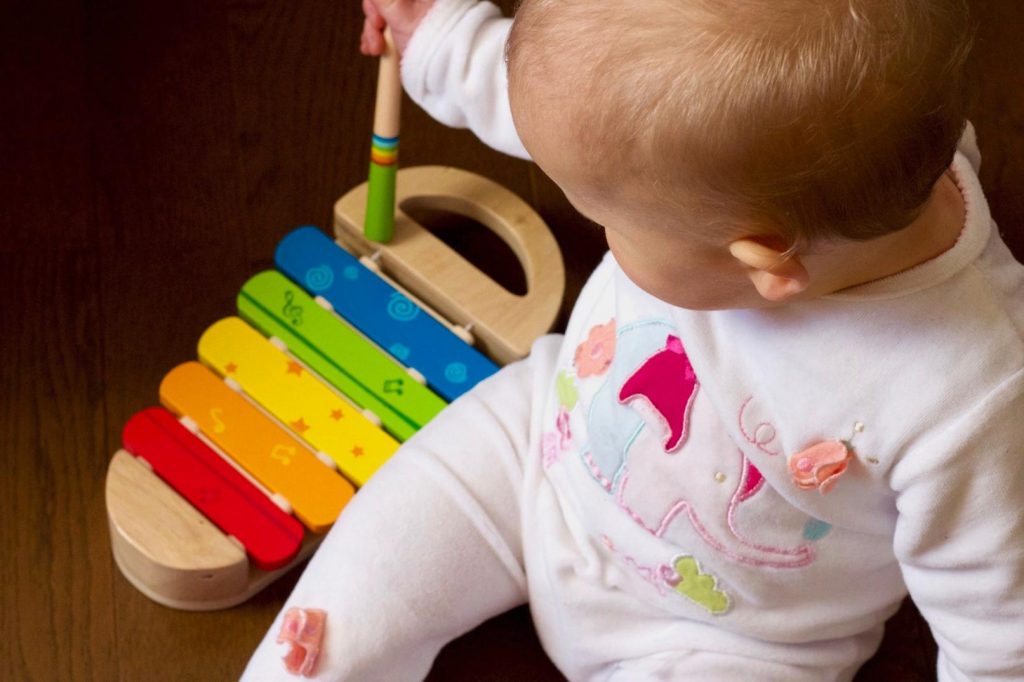
Six to seven months can be a fun time for babies to explore toys.
Eighth Month
Your baby is beginning to master some movements, and is also going to show interest in food! The transitions are still happening; while the previous months see them turning over, you’ll now see them progressing towards crawling. Some of the baby milestones in month eight are:
- Using a raking grasp to pull things towards them (swiping at objects with all the fingers open and reaching out).
- Trying to crawl , or already crawling.
- Pulling themselves up with furniture.
- Banging toys together.
- Developing unease when they get separated from you.
- Drooling ; some babies may cut their first teeth, so prepare for biting and crankiness.
Ninth And Tenth Month
Your little one is soon going to be on the move, eager to explore the world on their terms. This involves crawling around, pulling themselves up by pulling on furniture (watch out for tablecloth that can come crashing down) and babbling animatedly with a little more coherence. Your little one may reach milestones like:
- Playing peek-a-boo.
- Making noises to denote certain emotions (laughing when happy, rambling angrily when frustrated).
- Using a pincer grip (holding things between their thumb and index finger). This is a good time to introduce cutlery, but we’re warning you, things will get messy!
- Recognizing and pointing to things they want , and getting upset when you don’t give it to them.
- Shaking their heads to say no, waving their hands to say bye-bye .
- Properly crawling , and pulling themselves with ease.
- Saying ‘mama’ and ‘dada ’.
- Copying your behavior , like babbling into their hand or a toy phone to imitate you.
Eleventh And Twelfth Month
Before you know it, you’ve made it through nearly an entire year. Your little one is almost a toddler! At this age, you can expect milestones like;
- Cruising around the house i.e. holding onto furniture and walking around the house. They may even take a step or two by their first birthday, but this varies from baby to baby.
- Understanding simple statements like ‘don’t touch’.
- Putting food in their mouths with the pincer grasp.
- Exploring their understanding of objects by banging them, throwing them around, and putting them in their mouths.
- Understanding the use of certain objects , but still using them clumsily (spoon for eating, a comb to brush hair, a sipper for water).
- Pointing or looking at the right object or person (‘where’s dada?’ Or ‘where’s the dog?’)
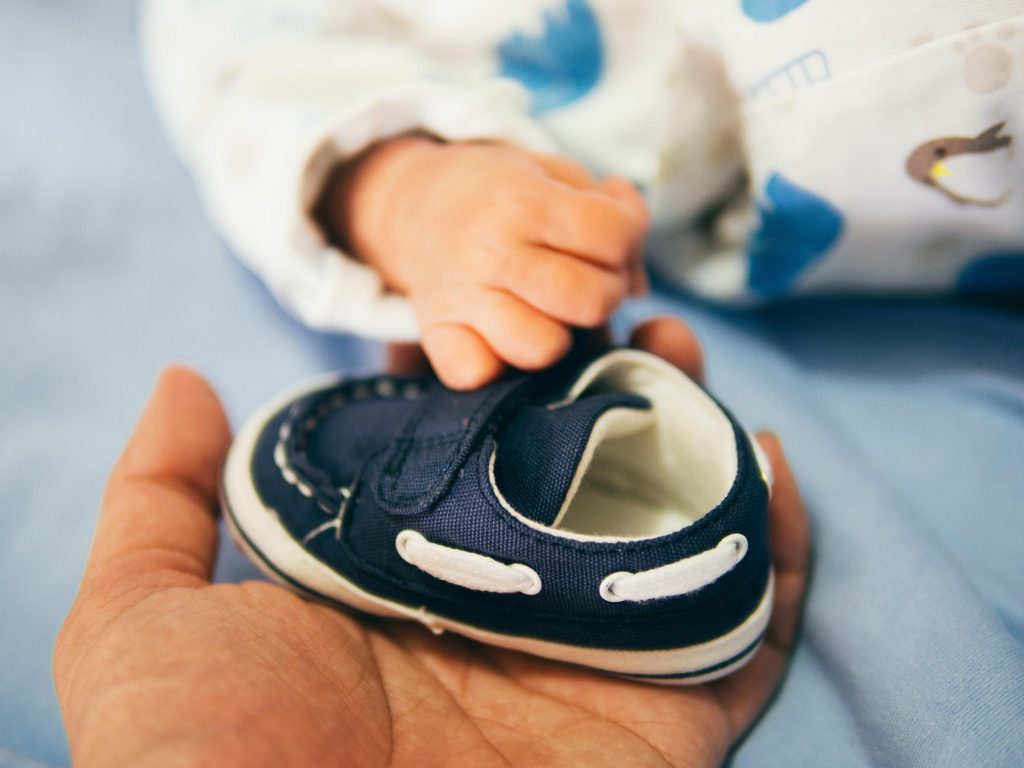
At 11 to 12 months, you can go shoe shopping since your little one will be trying to stand.
As we’ve already mentioned, these baby milestones for the first year are just approximates. Focus on the development of your little one instead of comparing them to a blog or to another baby. Ensure you track their growth chart if you’re worried about their development; this is also something you should communicate to your baby’s pediatrician.
Your baby’s first year is also important for another reason – vaccinations . You need to follow a vaccination schedule and ensure you make it to all your baby’s vaccination appointments . Worried about keeping track of their vaccinations, and of the several other things on hand? Download the ImmunifyMe app to get digitized vaccination records, appointment reminders, customized nutrition charts, and more.
FAQs On Baby Milestones: The First Year
What do babies do in their first year.
In their first year of life, babies learn to grasp objects, reach out and pull themselves, improve their vision and focus on tracking faces and objects, and wording simple syllables like mama and dada.
What Are The Three Major Milestones In The First Year Of Life?
There are several major milestones in your baby’s first year, but three of the most major ones include being able to stand or walk, being able to say simple words, and sitting up without support.
What Should A 1 Year Old Know?
A 1-year-old should know and respond to their own name. They should be able to recognize and point out people like their mother and father, and simple objects such as a dog, a chair, etc. A 1-year-old should also be crawling, if not standing up.
What Words Should A 1 Year Old Be Saying?
A 1-year-old should be able to say simple words with small syllables. These include the basic ‘mama’ and ‘dada’, directed at the right people. They should be able to say one to two other words, like having their own version of a pet’s name and associating it with them. At 1 year, a baby should say around 1 to 3 words.
About The Author
Related Posts
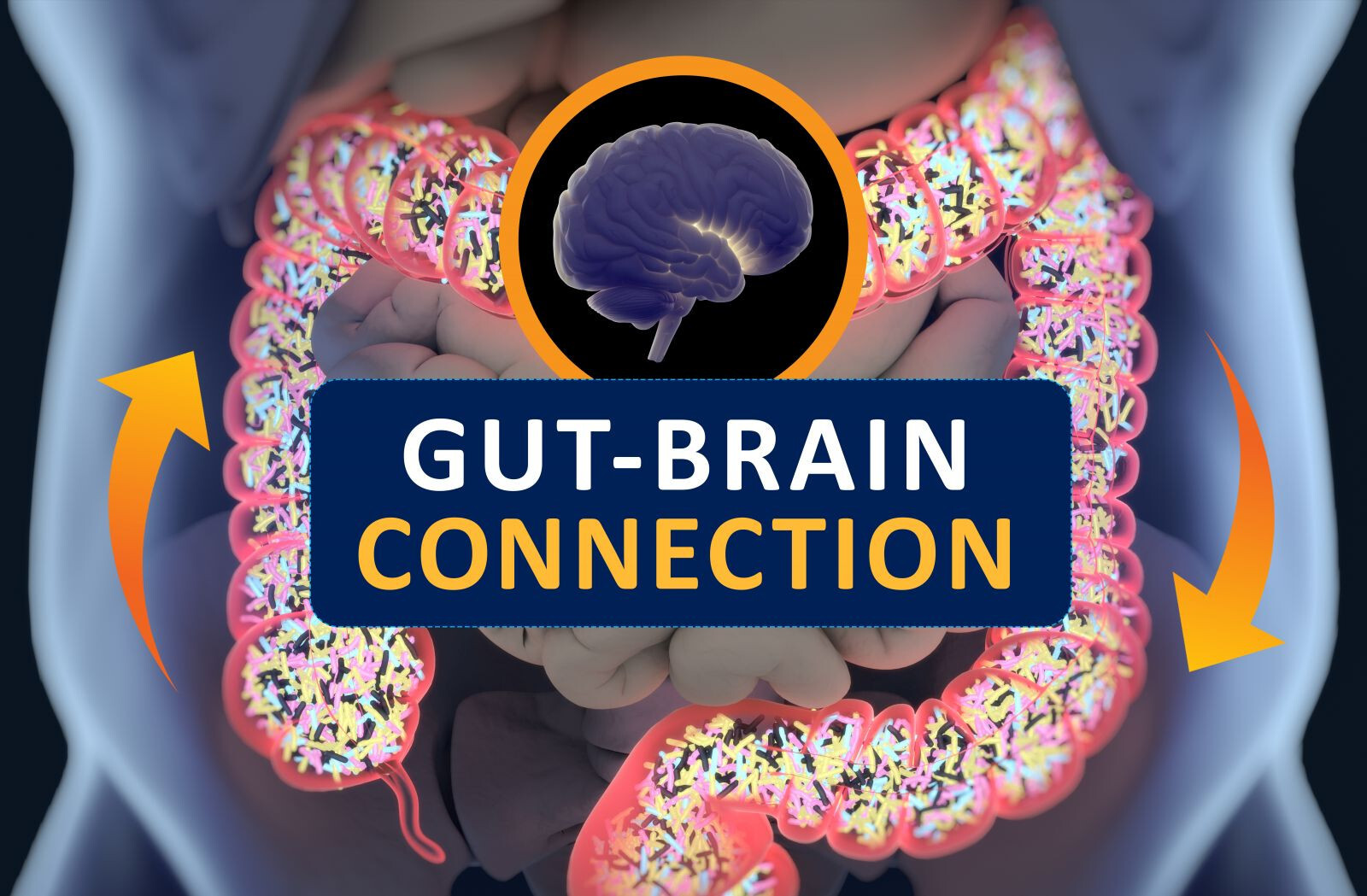
Gut Microbiome And Mental Health In Kids
May 11, 2021
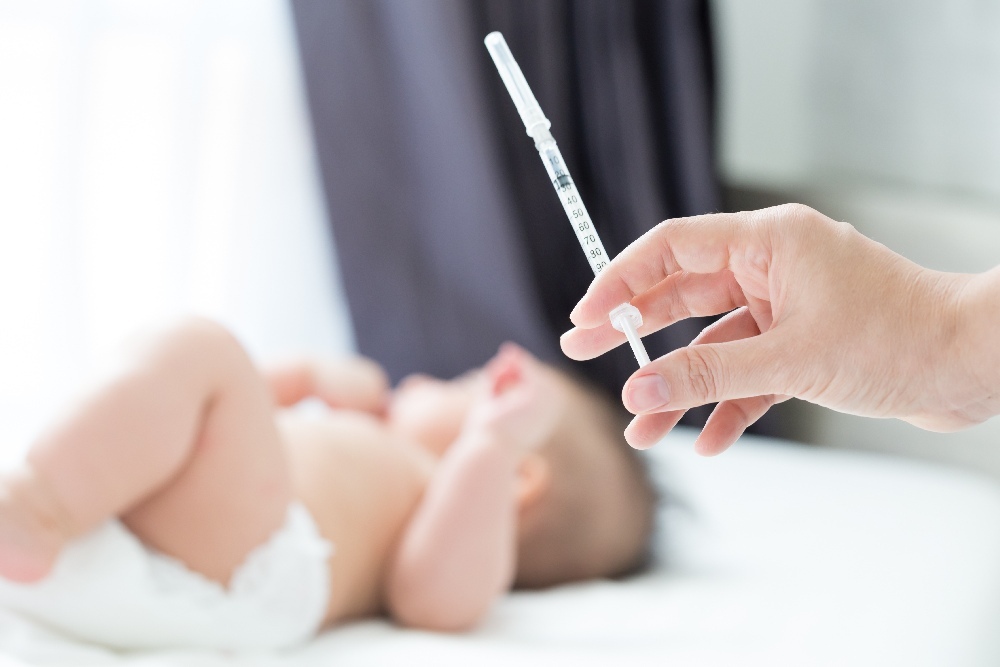
Vaccine Education – A Must In Both, Rural And Urban Populations
November 18, 2020

Lactose Intolerance In Babies
March 22, 2022
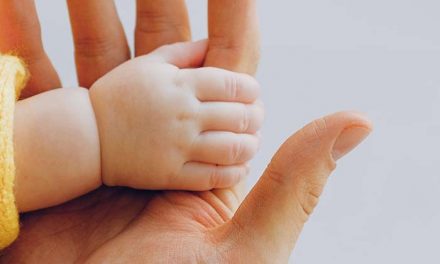
Anemia In Babies
March 25, 2022
Leave a reply Cancel reply
Your email address will not be published. Required fields are marked *
Save my name, email, and website in this browser for the next time I comment.
Recent Posts
- Infertility: Signs and Causes Pregnancy
- Prenatal Vitamins: When Should You Start Taking Them? Pregnancy
- Prenatal Care: Why Is It Important? Pregnancy
- Tips To Avoid A High-Risk Pregnancy Pregnancy
- Helping Your Partner With Postpartum Depression Pregnancy

GlowGPT Health Library
The First Year Journey: Unveiling Essential Milestones for Your Baby’s Growth
Content below are assisted by AI tools. Please see disclaimer below.
Last updated:
As a parent, witnessing your baby’s growth and development is an awe-inspiring experience. The first year of a child’s life is filled with numerous milestones that mark their physical, cognitive, and emotional progress. [1] In this comprehensive guide, we will explore the important milestones for babies in their first year, providing you with valuable insights and tips on how to support your little one’s development.
Month 1: Developing the Senses
During the first month, your baby is adjusting to life outside the womb. They begin to recognize your voice, gaze into your eyes, and respond to soothing sounds. Focus on providing a nurturing environment by talking, singing, and gentle touch to foster their sensory development.
Month 3: Grasping and Smiling
Around the third month, your baby starts gaining better control of their hands. They can hold onto objects and bring them to their mouth, exploring different textures. Additionally, you’ll witness the first adorable smiles and delightful cooing sounds, indicating their growing social skills.
Month 6: Sitting and Solid Food
At six months, your baby reaches a significant milestone—sitting up unassisted. This opens up a whole new world of exploration. Introducing solid foods at this stage is also crucial for their nutritional needs. Consult your pediatrician for appropriate food choices and the best approach to begin the weaning process.
4. Month 9: Crawling and First Words
By the ninth month, your baby may start crawling, an exciting milestone that promotes their physical development. They will also begin to experiment with sounds and babble, attempting their first words. Encourage their language skills by engaging in conversation, repeating simple words, and reading aloud together.
Month 12: Walking and Self-Feeding
The first year culminates in the remarkable achievement of walking independently. Around their first birthday, your baby may take those first wobbly steps, marking a major motor milestone. Encourage their confidence by creating a safe environment and providing support with sturdy furniture or a push toy. At this stage, they may also express interest in self-feeding, allowing them to develop their fine motor skills and independence.
Cognitive Development Throughout the Year
In addition to physical milestones, your baby’s cognitive development progresses rapidly throughout their first year. [2] From recognizing familiar faces and objects to imitating actions and understanding simple instructions, their brain is a sponge absorbing new information. Engage them with age-appropriate toys, games, and interactive play to nurture their cognitive abilities.
Emotional and Social Milestones
Babies thrive on emotional connections, and their first year is crucial for developing social skills. From expressing joy and excitement to experiencing separation anxiety, they go through a range of emotions. Encourage their social interactions through playdates, exposure to new environments, and positive reinforcement. Responding to their emotional needs with love, care, and a secure environment is vital for their overall well-being.
Fine Motor Skills
Throughout the first year, your baby’s fine motor skills progress steadily. They learn to grasp objects, manipulate toys, and develop hand-eye coordination. Provide them with toys that promote grasping and stacking, such as building blocks or shape-sorting toys, to further enhance their dexterity.
Sleep Patterns and Development
Sleep plays a crucial role in your baby’s development. During the first year, they transition from shorter, frequent naps to longer stretches of sleep at night . Establish a consistent bedtime routine and create a soothing sleep environment to support healthy sleep patterns, which are vital for their growth and well-being.
The Importance of Regular Check-ups
Regular pediatric check-ups are essential to monitor your baby’s growth, address any concerns, and ensure they are meeting developmental milestones. These visits provide an opportunity to discuss feeding habits, vaccination schedules, and any questions you may have as a parent. Stay informed and collaborate with healthcare professionals to give your baby the best possible start in life.
Your baby’s first year is an extraordinary journey filled with momentous milestones. By understanding these crucial developmental stages and providing a nurturing environment, you can actively participate in their growth and support their overall development. Celebrate each milestone, big or small, and cherish the remarkable moments as you embark on this incredible adventure of parenthood.
Sources [1] https://www.cdc.gov/ncbddd/watchmetraining/module2.html [2] https://nap.nationalacademies.org/read/19401/chapter/8
GlowGPT content was prepared by staff writers at Glow with the help of AI tools. The information is for general informational purposes only and is not intended to be medical or other professional advice, treatment, or diagnosis. Always seek the advice of a qualified health provider with any questions you have regarding a medical condition. Never disregard professional medical advice, or delay in seeking it. AI systems are rapidly evolving and given the probabilistic nature of machine learning, use of this system may in some situations result output that is incorrect, incomplete, or does not accurately reflect real people, places, or facts. You should evaluate the accuracy of any output as appropriate for your use case, including by using human review of the output. We strongly recommend that you consult with a qualified health provider before making any decisions regarding your, your child’s, or any other person’s health based on information provided here.

Let’s Glow!
Achieve your health goals from period to parenting.

The Top Baby Tracker App: Embrace New Beginnings with Tender Care

The Top Fertility Tracker App: Your Path to Achieving Pregnancy

The Top Pregnancy App: Nurturing Your Journey to Motherhood

The Top Period Tracker for Empowering Your Menstrual Health Journey
75 First Birthday Quotes to Wish Your Favorite Baby a Beautiful Day
Wish your little one the best of days with one of these sweet and sassy happy first birthday messages!
Stephanie has been freelance writing for ten years and has been published in many national publications. She enjoys writing in various voices and on a variety of topics.
Learn about our Editorial Policy .
Nothing changes your life more than having a baby. It's amazing how this little person can make everyone's lives so much more meaningful. This makes their first birthday quite a momentous occasion.
No matter if you're the parent, best friend, or a close relative, when that baby reaches this milestone, you'll want to share some worthwhile words of wisdom and some wonderful well wishes. If you are looking to say more than just "Happy first birthday" or "Happy birthday baby," we have a collection of beautiful and fun first birthday quotes for you to choose from.
Cute First Birthday Quotes
A first birthday is a big moment in a baby's life. Celebrate this milestone by using one of these happy birthday baby messages that can be used for either a little boy or little girl.
- You've brought a year of happiness to all who know you. Wishing you a day of smashed cake, lots of presents, and another year of joy.
- Thank you for letting us celebrate your first year of life. Sending you hopes for joy and happiness on this year's special day.
- Happy birthday to the sweetest, smartest, funniest, most loving one-year-old I know. Have an amazing day celebrating YOU!
- Though you have only been on this Earth for a year, your life has made a big impact on so many. Have a happy birthday and many wishes for a wonderful upcoming year.
- My, oh my, how time flies. I can't believe that a year has gone by! I hope your day is as incredible as you.
- Twinkle, twinkle little star, a year one old is what you are!
- To the best baby around — I guess I can't call you that anymore though. Welcome to toddlerhood! The world is your playground. Have fun exploring!
- It's an extra special day because a very special baby has a birthday.
- What a joyful time your first year has been! Many wishes for love, happiness, and all good things in every year to follow.
- 21 Things to Say on the First Birthday After the Death of a Loved One
- 105+ Heavenly Birthday Quotes for Family or Friends
- 75+ Death Anniversary Quotes & Remembrance Messages
First Birthday Quotes for Baby Boys
"They say that if a woman's first child is a girl, most likely the mother needed some maturity, but if it was a boy, she needed to know the real meaning of love ." As the parent of a boy mom, I truly believe this. Baby boys love so immensely, so make sure to share this love on their big day.
- To the wild child who loves to explore and has no off-switch. Wishing you a year of nimble leaps and cushioned falls. I hope your joy is as endless as your energy!
- Boy, Oh, Boy! Look who is turning one! Hoping your day is filled with fun!
- To the boy with the gentlest heart — your love for life is inspiring and I find joy every time I am in the room with you. I hope that year two is filled with magical moments and even more love.
- You started as this little bundle in blue, and now look at you! My, have you grown, as the last year has flown. I cannot wait to see what you do, between now and when you turn two!
- Happy first birthday handsome little lad. When you joined our brood, we sure were glad. Wishing you smiles and joy every day, as you explore the world in fun and different ways.
- Happy birthday to this family's main man. Needless to say, you have deranged all of our plans. We can't seem to resist saying yes to you. Enjoy this next year, because it all changes when you turn two!
- To a dapper little dude! You have charmed us from day one and we hope that your birthday is filled with fun!
Happy First Birthday Quotes for Baby Girls
She's had you wrapped around her finger since day one! Make sure that her first birthday quote shows off this past year's fun.
- It's only been a year with our little girl, but someone she managed to get into our hearts with just a swirl and twirl.
- Happy birthday to a beautiful little girl who has danced and spun and giggled her way into the hearts of many.
- Those eyes, that smile, and your gorgeous head of hair. You could say that Snow White has some competition for the one who is most fair. We love you little princess with all of our hearts! We hope that your next year is a work of art.
- To our terrific tomboy — we love that you go against the grain, and prove that all that matters is what is in your little brain. You are smart and you are sassy, and you have a smile that kills. We hope your day is filled with fun and all of life's frills!
- To a girl who is beautiful inside and out — we wish you nothing but happiness on this day and beyond. Have the bestest of birthdays! We love you bunches!
- Sugar and spice and everything nice! That's the only way to describe you! Happy birthday to our little queen!
- I don't think we could have ever prepared for you, little girl. You're a spitfire and a saint, all wrapped in one, and you make our life so much fun. We wish the happiest of birthdays to you, and can't wait to see what you manage to do between now and two!
- Happy Birthday, Beautiful Quotes
Adorable Baby Birthday Quotes for Twins
Twins bring twice the joy and chaos to our lives. As your double trouble approaches their big day, make sure to say happy first birthday in a very special way! You can always use the first birthday quotes listed above, or you can customize it for your little look-a-likes with unique messages like these:
- Twin Boys: Double the trouble and twice the fun! So glad that our favorite boys have turned one.
- Twin Girls: Sugar and fluff and a little spice. Giggles and smiles and all that is nice. Pink and ruffles, lace and pearls. We are so blessed to know these two little girls. Now it's time for gifts and cake, and memories made for a celebration of a year of life that we'd never trade.
- Boy and Girl Twins: Wishing you double the cake, twice the fun, and two times the joy, to an amazing girl and wonderful boy.
Memorable First Birthday Quotes From the Parents
Congratulations! You survived the first year! It can be hard to put into words a happy first birthday message when so many wonderful things have happened in the last 365 days. No need to fret — we have some perfect phrases to wish your little one the very best!
- To the piece of my soul that I never knew existed — your presence in my life is the best thing that has ever happened to me. I cannot wait to see the amazing things that you accomplish in the next year and beyond. Wishing you nothing but happiness on your special day.
- A year of giggles, hugs, and sleepless nights. A year of first steps, first words, and new sights. A magical journey full of surprises and fun, our favorite baby is about to turn one!
- Every day of your life you have been a blessing. Just when I think that you couldn't get cuter, funnier, or smarter, you somehow manage to do it. On your birthday, I wish you everything your heart desires and more.
- Life has been sweeter, more adventurous, and a ton more fun since you've been in it. Birthday blessings to my precious child.
- We didn't know what we were missing until you came into our lives. You are our everything and we love you with all our hearts. We hope that you have the happiest of birthdays and a spectacular next year!
- Blessings to you, little one, on your special birthday. I cannot believe a year has gone by, and how you have grown in the blink of an eye. Looking forward to seeing all the amazing things you do and how you will continue to transform into a perfect version of yourself!
- To my sweet love — even though it was just a short year ago, I can't seem to remember life without you in it. It's like my life truly began the day you were born. Thank you for bringing me immense happiness. I cannot wait to grow along with you. I love you, baby boy/girl!
- I am not going to lie, not every part of this year was swell. I could have done without the screams and smells. But looking back, I'd have to say, I'd do it all over again, every single day. You are a perfect combination of me and your dad, and every day with you makes us thankful and glad. Happy birthday sweet baby! You have made us a lucky man and lady.
Parents who adopted their children may want to recognize it with a special quote that highlights their love: "You may not have my eyes or smile, but on this special birthday, I want you to know that you've had my heart from the moment I met you."
Happy First Birthday Messages From Aunts & Uncles
For the aunties and uncles who want to share their love and excitement over their littlest family member, here are some sweet first birthday quotes for nieces or nephews to add to a card or social post.
- Happy first birthday to the kid who changed my brother/sister's life for the better. You have had such an amazing impact on all of our lives. I hope that your big day is as beautiful as you!
- To the sweet boy/girl who made me an aunt/uncle! You light up my life with your beautiful smile and adorable giggles. I hope your day is as special as you.
- Happy first birthday! Auntie/Uncle ________ loves you so very much!
- Sending birthday wishes to my brother/sister's mini-me! You are the cutest little nugget and I love having you in our family.
- Dear niece/nephew, I wish you the happiest of birthdays and the greatest of adventures in the coming year. Maybe invite me to join in on one of your escapades next time?
- To a smart, wonderful, and fun niece/nephew! Have a spectacular birthday!
- Happy happy birthday! We cannot wait to celebrate you when we see you next. You take the cake when it comes to nieces/nephews!
- Happy birthday sweet niece/nephew! It has been a joy watching you grow over the past year. You have become the most amazing little person! We cannot wait to see how you continue to transform into an incredible human being.
Happy Birthday Baby Quotes From Grandparents
Grandparents are such an important part of a child's life, which makes what you say very important. This first birthday, make sure that your grandbaby knows how much you cherish them.
- To our darling granddaughter/grandson, You are such a blessing in our lives and we love you so very much. We hope that your first birthday is filled with cake, balloons, bubbles, and fun!
- To our first grandchild! What a year this has been! You are the breath of fresh air we needed, and it has been so spectacular getting to know the perfectly wonderful you! Happy birthday.
- Becoming a grandparent has been the greatest joy. Thank you for lighting up our lives with love. Wishing you the happiest of birthdays and the best second year!
- To the cutest baby around — [insert your grandparent name] loves you so very much. Let your mommy and daddy know that I am always available for snuggles and cuddles. Who could resist that face? Keep charming everyone in this next year. I know that you will only get more adorable!
- It is amazing how much joy [insert baby's birth weight (e.g. 7 pounds 6 ounces)] can bring to your life! We are so thankful that you came into our lives and cannot wait to see what the next year will bring. Happy birthday!
- [Insert grandparent names] love you so much! Happy birthday to our big boy/girl! We cannot believe a year has gone by and how much you have grown. Have an amazing party!
- Happy birthday to the very best grandson/granddaughter! You light up our lives and bring us so much happiness. Have the best day.
- To the baby who has brought adventure back into our lives! We have loved getting to spend so much time with such a vibrant little boy/girl over the past year. Based on how your mom/dad was at one, you are about to become quite the little explorer and we cannot wait! Happy birthday.
Happy Birthday Baby Sayings From Family Friends
Just because you aren't related by blood or marriage doesn't mean that you don't hold a special place in a child's life. For those friends who are really family, make sure to share your love of this wonderful baby with a heartfelt first birthday quote!
- Even though I'm an unofficial aunt/uncle, I want you to know, sweet baby, that you are my family. Have the happiest of birthdays!
- You, sweet boy/girl, have transformed my best friend into an even better person. Thank you for being in our lives. We love you so much.
- Happy birthday kid! Thanks for bringing joy to our lives. We love getting to see you grow.
- To the cutest of babies! You have managed to win the hearts of more than just your family. I cannot resist those adorable buck teeth and slobbery kisses. Happy birthday, cutie!
- FINALLY! You are ONE! Now we can start doing the big kid stuff that I've been waiting for. Want to go to the zoo or aquarium? I'm your gal. Need a park pal? Gimme a call! Happy birthday to my favorite adventure buddy. Oh, the places we are about to go!
- Happy birthday to my bonus best friend! I have loved getting to be a part of your life and I'm so thankful that my bestie decided to add you to her brood. Can't wait to hang out soon!
- The best things come in small packages. Happy birthday to my favorite little dude/lady!
Funny Baby Birthday Quotes to Gift Some Laughs
If you want your happy first birthday message to begin with a pun, we are here to grant this birthday wish. Even if the guest of honor doesn't get it, it is sure to make the other attendees grin!
- I can't cake my eyes off of you! How are you already one?!
- Hey, baby! It’s sherbert day!
- Have a flantastic birthday niño/niña!
- Happy first birthday to a dino-mite little dude! I hope your birthday is the tricera-tops!
- Happy birthday to the kid who makes life so funfetti!
- No matter how you slice it, you take the cake little guy/lady!
- Happy birthday shortcake! You are simply the sweetest around!
- Not to be cheesy, but life is so much cheddar with you in it! I hope that you have a grate day.
- Celebrating you is a piece of cake! You are such a sweet kid and you always bake our day!
- Sending s'more birthday wishes to the sweetest babe around!
- Birthday Jokes to Cake Their Day
Famous Birthday Quotes Perfect for Baby's Special Day
Sometimes the best way to wish your little one a happy birthday is with a famous quote! These happy birthday baby messages are a great way to express the importance of celebrating this day.
- "Every birthday is a gift. Every day is a gift.” - Aretha Franklin
- "Today you are you, that is truer than true. There is no one alive who is you-er than you. Shout aloud, I am glad to be what I am!" - Happy Birthday to You! by Dr. Suess
- “We turn not older with years, but newer every day.” - Emily Dickinson
- "There ought to be a time, that we can set aside, to show just how much we love you. And I'm sure you would agree, what could fit more perfectly, than to have a world party on the day you came to be." - "Happy Birthday" by Stevie Wonder
- "Oh, darlin', don't you ever grow up, don't you ever grow up. Just stay this little." - "Never Grow Up" by Taylor Swift
- "Do your dance, it’s your birthday.” - "Birthday" by Usher and Zaytoven
- "Wasn’t it just yesterday, I felt your skin on mine. Held you in my arms, looking in your eyes (fell in love a billion times). From a crawl to a walk, first breath to talk, letting go of that bike, with the training wheels off, but watch that clock… those hands they never stop." - "They Grow Up Too Fast" by Jimmy Charles
Tips for Using Baby Birthday Quotes
First birthday quotes, sayings, and poems can be used in a variety of ways. From invitations to the big celebration to heartfelt cards, and even custom gifts, these sweet words can add an extra touch of birthday magic on your baby's big day!
Invitations
If you are creating your own birthday invitations, consider using a quote or saying along with a photo of your baby or an animated image. Quotes can easily be turned into party invitation wording. For instance:
- Celebrate a year of life and love with our precious little gift from above!
- Come and join the fun! Our baby boy/girl is turning one.
Use the quote on the front of the invitation, as part of the design, on the interior as part of the verse, or as an insert!
If you're creating a scrapbook of the child's birthday, use a verse or two on the pages to help convey your thoughts and feelings. Simply copy and paste or type your favorite verse on your computer and print it out on acid-free paper to use in your layout.
Create a birthday card to give at the party by incorporating a meaningful quote. A homemade card can be a wonderful accompaniment to a gift or can be used as a way to give money.
Use your favorite quote to decorate a fun sign or board to give as a gift for the birthday baby. This can act as a keepsake or cute room decor.
Additional Ideas
In addition to using these quotes in the tangible ways above, consider using them in a speech given at a birthday party. You can also use them in a letter written for the birthday child or as a part of a video or photo slideshow made to show at the party.
Beautiful Thoughts for a Baby's Birthday
No matter how you choose to use your favorite first birthday quote, these meaningful words can be the perfect way to help convey your emotions to the child. Customize the quote to suit the baby in your life and showcase the love you have for them!

- Children's Books
- Growing Up & Facts of Life

Enjoy fast, free delivery, exclusive deals, and award-winning movies & TV shows with Prime Try Prime and start saving today with fast, free delivery
Amazon Prime includes:
Fast, FREE Delivery is available to Prime members. To join, select "Try Amazon Prime and start saving today with Fast, FREE Delivery" below the Add to Cart button.
- Cardmembers earn 5% Back at Amazon.com with a Prime Credit Card.
- Unlimited Free Two-Day Delivery
- Streaming of thousands of movies and TV shows with limited ads on Prime Video.
- A Kindle book to borrow for free each month - with no due dates
- Listen to over 2 million songs and hundreds of playlists
- Unlimited photo storage with anywhere access
Important: Your credit card will NOT be charged when you start your free trial or if you cancel during the trial period. If you're happy with Amazon Prime, do nothing. At the end of the free trial, your membership will automatically upgrade to a monthly membership.

Download the free Kindle app and start reading Kindle books instantly on your smartphone, tablet, or computer - no Kindle device required .
Read instantly on your browser with Kindle for Web.
Using your mobile phone camera - scan the code below and download the Kindle app.

Image Unavailable

- To view this video download Flash Player

Follow the author

Baby's First Year: A Journey of Milestones Hardcover – June 18, 2023
Purchase options and add-ons.
This book is illustrated with wild animals to suit all, with spaces for photographs and journal pages to write down those special moments. The easy to follow pages allow you to place a photograph of all of babies first milestones and record the date, place and other information of that special moment. Inside this baby journal you can find: * Baby's first arrival section * My Family * All Baby's Firsts milestones * Month-by-month sections to record new achievements. * Spaces for monthly photographs and those special milestones. * Hardback and full colour interior * 76 pages of memories to keep. This Baby Book is the PERFECT GIFT for someone expecting their first / second or even third child. Replace those lose paper notes and photos stored on several devices with this beautiful keepsake memory book that you can cherish for years to come.
- Print length 76 pages
- Language English
- Publication date June 18, 2023
- Dimensions 8.25 x 0.37 x 11 inches
- ISBN-10 1739464214
- ISBN-13 978-1739464219
- See all details

Product details
- Publisher : Ink & Art Publishing Studio (June 18, 2023)
- Language : English
- Hardcover : 76 pages
- ISBN-10 : 1739464214
- ISBN-13 : 978-1739464219
- Item Weight : 8.8 ounces
- Dimensions : 8.25 x 0.37 x 11 inches
About the author
Kirsty bowe.
Embracing her Yorkshire roots, Kirsty is a mother of 2, and a keen animal enthusiast, in which she holds a Full Honours Degree. Kirsty brings a creative and personal understanding of the challenges and joys that come with growing up. Her experiences as a parent and previously as an educator enrich her writing, offering authenticity and emotional depth that resonate with families and caregivers alike.
As a children's author, Kirsty specialises in writing from a child's point of view, bringing authenticity and a deep understanding of children's perspectives to her stories. Her works often explore themes of emotional understanding and resilience, helping young readers realise that experiencing big feelings is normal and that they are not alone. Through her stories, Kirsty reassures children that things will always get better, fostering hope and emotional growth.
Her heartfelt books help children understand and navigate their emotions, reassuring them that they are seen, understood, and supported, while also equipping adults with the resources to guide them.
Check out her Website for the latest and up and coming book releases. Subscribe so you can be the first to know.
Customer reviews
- 5 star 4 star 3 star 2 star 1 star 5 star 0% 0% 0% 0% 0% 0%
- 5 star 4 star 3 star 2 star 1 star 4 star 0% 0% 0% 0% 0% 0%
- 5 star 4 star 3 star 2 star 1 star 3 star 0% 0% 0% 0% 0% 0%
- 5 star 4 star 3 star 2 star 1 star 2 star 0% 0% 0% 0% 0% 0%
- 5 star 4 star 3 star 2 star 1 star 1 star 0% 0% 0% 0% 0% 0%
Customer Reviews, including Product Star Ratings help customers to learn more about the product and decide whether it is the right product for them.
To calculate the overall star rating and percentage breakdown by star, we don’t use a simple average. Instead, our system considers things like how recent a review is and if the reviewer bought the item on Amazon. It also analyzed reviews to verify trustworthiness.
No customer reviews
- Amazon Newsletter
- About Amazon
- Accessibility
- Sustainability
- Press Center
- Investor Relations
- Amazon Devices
- Amazon Science
- Sell on Amazon
- Sell apps on Amazon
- Supply to Amazon
- Protect & Build Your Brand
- Become an Affiliate
- Become a Delivery Driver
- Start a Package Delivery Business
- Advertise Your Products
- Self-Publish with Us
- Become an Amazon Hub Partner
- › See More Ways to Make Money
- Amazon Visa
- Amazon Store Card
- Amazon Secured Card
- Amazon Business Card
- Shop with Points
- Credit Card Marketplace
- Reload Your Balance
- Amazon Currency Converter
- Your Account
- Your Orders
- Shipping Rates & Policies
- Amazon Prime
- Returns & Replacements
- Manage Your Content and Devices
- Recalls and Product Safety Alerts
- Registry & Gift List
- Conditions of Use
- Privacy Notice
- Consumer Health Data Privacy Disclosure
- Your Ads Privacy Choices
Animoto Blog
- Video Marketing
- Video Ideas
- News & Features
How to Create a Video of Your Baby’s 1st Year
Apr 9, 2012
Your little one’s first year flies by so quickly! But a video covering all the changes and milestones you experienced with your baby is a wonderful way to share and preserve memories of that all-important first year of life.
To help you make your video, we put together a list of 20 major moments during your baby’s first year. Check them out in the video below, or take a look at the infographic featuring the complete list at the end of the post.
Baby’s first year video songs
Now that you’ve put together your pictures and video clips, it’s time to choose music. Pick a song that matches the images you’ve chosen. Take a look at a few of our favorites in the video below. If you find one you like, just copy the song title as its listed below and add it to your video.
- “Whimsical Journey” by Abbas Premjee
- “Bedtime Song” by Mindy Gledhill
- “You Make Me Smile” (Instrumental) by Ernie Halter
- “Bedtime Story” by Adi Goldstein
- “Ou Mas-Tu Cache” by Robert Walsh
- “You Are My Sunshine” by 3Theory
Once you finish your video, share it! Post it on Facebook or Instagram, or email it to friends and family. As years go by, you can take it out again and again to show your little one what they were like when they were small.

- Marketing video
- How-to video
- Slideshow video
- Social media
- Promo video
- Birthday video
- Intro / Outro videos
- Explainer video
- Email marketing
- Training video
- Internal communications video
- Presentation video
- Photography
- Real Estate
- Marketing Agency
- HR / People Ops
- Video commenting tool
- Screen recorder
- Photo video maker
- Music library
- Online video editor
- Video trimming
- Stock library
- Privacy policy
- Terms of use
- Animoto Tutorials
© 2024 Animoto Inc. All Rights Reserved.

COMMENTS
Developmental milestones for 1-year-olds. Age 1 movement milestones. Age 1 cognitive milestones. Age 1 language and communication milestones. Age 1 social and emotional milestones. When to talk to your doctor about your 1-year-old's development. Every child is one of a kind. And just as his eyes are brown or his laugh is peppered with cute ...
Ninth month. Tenth month. Eleventh month. Twelfth month. See a doctor. Takeaway. Buckle up, parents! Your baby's first year is a whirlwind of milestones. You've already seen them take their ...
Like no other baby milestone, a full night of sleep becomes the Holy Grail for new parents. While it is unrealistic and unhealthy to expect a newborn to sleep all night, parents can rest assured ...
The first year of your baby's life is an exciting and sometimes overwhelming time. With new developments that happen day-by-day, week-by-week, and month-by-month, it can be hard to keep up! As a ...
10-12 Months. As your baby approaches 1 year, they can explore more of the world than ever before. They have learned new ways to communicate with you and others, and is getting more mobile every ...
The first year of a baby's life is a remarkable journey filled with numerous developmental milestones. These milestones encompass physical, cognitive, and emotional changes that mark the growth and progress of your little one (like crawling, first steps and solid food). While every baby is unique and develops at their own pace, general patterns and behaviours are associated with each milestone.
Midway through your baby's first year, their milestone achievements may vary more wildly. For example, while your friend's baby might start crawling at 6 months, yours may wait until closer to 10 ...
Help your baby get used to foods with different tastes and textures. Foods can be smooth, mashed, or finely chopped. Your baby might not like every food on the first try. Give your baby a chance to try foods again and again. Give your baby time to get to know a new caregiver. Bring a favorite toy, stuffed animal, or blanket to help comfort your ...
The first year of a baby's life is an incredible journey filled with precious milestones and cherished memories. It is during this time that parents witness their little ones grow and develop at a remarkable pace.
Here's your guide to your baby's first year and all its major milestones (first smile, giggle, step, words), challenges (colic and teething and diaper rash, oh my!) and more. In This Section . Your Newborn Week by Week; Your Baby From 0 to 6 Months; Your Baby From 7 to 12 Months.
There's nothing better than making someone smile. 2. Laugh - Laughter is the best medicine and remembering that first giggle is something you will always cherish. 3. Sat up, rolled over, crawled - These are all milestones giving momentum towards taking those first steps. All are exciting developmental milestones and something to be noted.
Celebrate their achievements, provide stimulating environments, and always consult with healthcare professionals to ensure they are developing at a healthy pace. Understanding and supporting your baby's development can make this first year a wonderful journey of growth and discovery. 9-Month Baby Milestones: Weeks 37-40
Mar 14, 2024. The initial year of a baby's life is brimming with captivating milestones. From the rapid transformation of newborns into lively infants to the emergence of bustling toddlers, the journey unfolds swiftly. Seasoned parents consistently offer the same advice to expectant parents: "cherish every moment!"
The journey of your baby's first year is a whirlwind of love, learning, and growth. By creating a treasured keepsake with journal entries, memorabilia, and heartfelt letters, you are capturing the essence of this extraordinary time. It is a gift that will resonate with your child as they grow older, allowing them to revisit their early years ...
After weeks of pulling up on the furniture and scaling it, a baby may take their first independent steps between 9 to 12 months. However, every child is unique; some may start walking as early as 8 months or as late as 18 months. These first steps signify a momentous leap in your baby's growth journey and exploration.
From 4 to 6 months old, your baby will probably: Roll over from front to back or back to front. Front-to-back usually comes first. Babble, making sounds that can sound like real language. Laugh ...
The Journey to Your Baby's First Steps: What Parents Should Know. The first year of life is a remarkable period in your baby's development. In just a short time, they transform from a helpless newborn into a walking toddler. Those first steps are unforgettable, marking the beginning of a new world of learning and exploration. ...
The first year of your baby's life is when you're going to look out for these milestones the most. Being a crucial year of an infant's development, baby milestones in the first year can help you identify whether or not all is well with your baby. Read on to learn more about these first-year baby milestones. What To Remember About Baby ...
In this comprehensive guide, we will explore the important milestones for babies in their first year, providing you with valuable insights and tips on how to support your little one's development. Month 1: Developing the Senses. During the first month, your baby is adjusting to life outside the womb. They begin to recognize your voice, gaze ...
First Year for Your Newborn Baby
A year of giggles, hugs, and sleepless nights. A year of first steps, first words, and new sights. A magical journey full of surprises and fun, our favorite baby is about to turn one! Every day of your life you have been a blessing. Just when I think that you couldn't get cuter, funnier, or smarter, you somehow manage to do it.
Baby's First Year - A Journey of Milestones - Keepsake Memory Book Capture and record all your baby's first memories and milestones in their first year with this book. They grow up soo quickly, and all those special moments may be forgotten over time. However this easy to follow beautifully designed book will become a wonderful memento that ...
This video is about Sweet Videos of Mia. A story of her 1 year growth from birth. #Babys1stBirthday #1stBirthdayCelebration #FirstYearReflection
Baby's first year video songs. Now that you've put together your pictures and video clips, it's time to choose music. Pick a song that matches the images you've chosen. Take a look at a few of our favorites in the video below. If you find one you like, just copy the song title as its listed below and add it to your video. Once you ...
Join Ms. Vivi for a bittersweet farewell as she reflects on her first year of teaching. In the final episode of My First Year, witness the emotional journey as Ms. Vivi says goodbye to her beloved students. Watch as she packs up her classroom, shares heartfelt messages, and reminisces about the incredible year they've shared.
Baby Vivaan is one of our cutest One Year Journey Babies. Compiled his 12 months shoot video for his 1st Birthday Party.One Year Journey :12 sessions over 12...